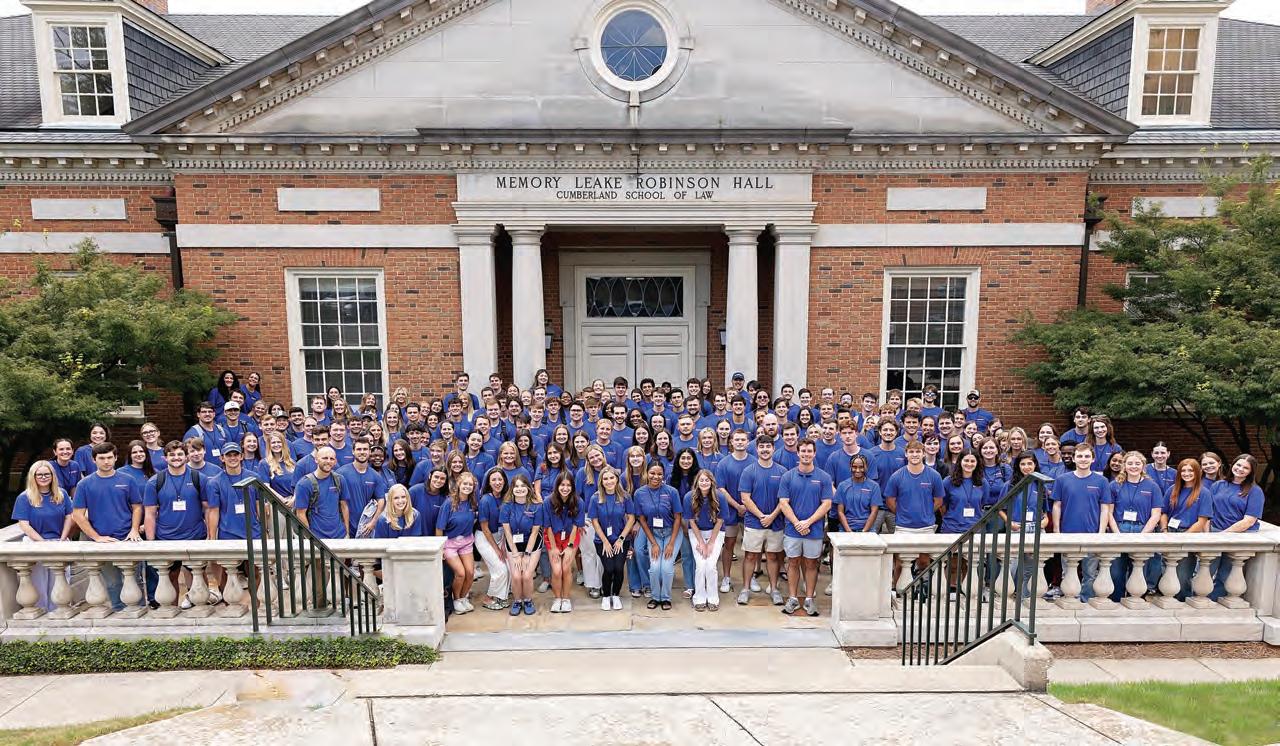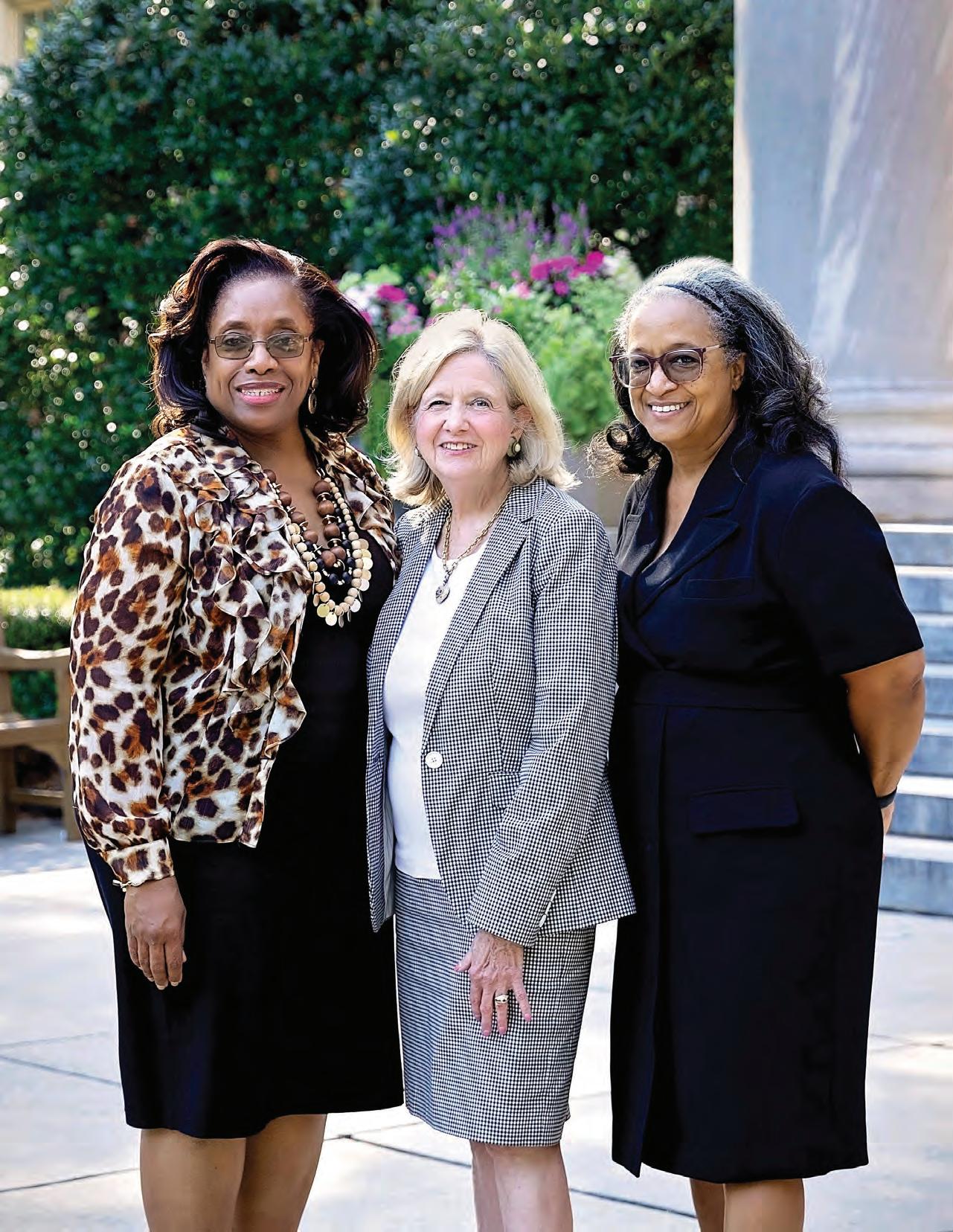

CUMBERLAND LAWYER
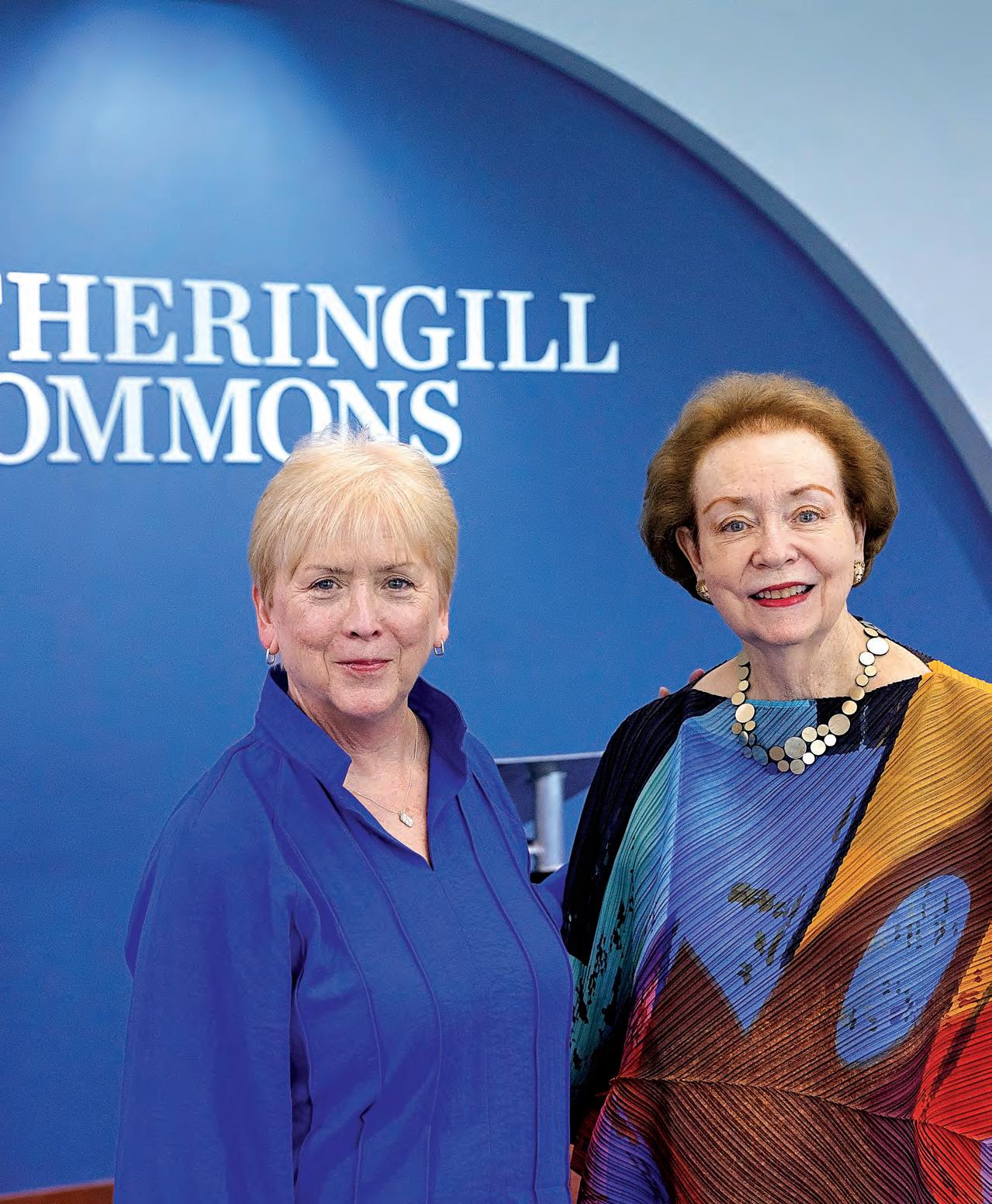
Robin Andrews, JD '91, and professor emerita Carolyn Burgess Featheringill connect at the ribbon cutting ceremony for Featheringill Commons on Aug. 13. Read the full story on page 17.
ON THE COVER: Cynthia Ransburg-Brown, JD '98, Leslie Barineau, JD '85, and professor LaJuana Davis are instrumental leaders in our clinical programs. See the feature on page 13.

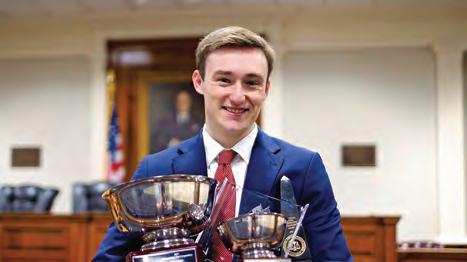
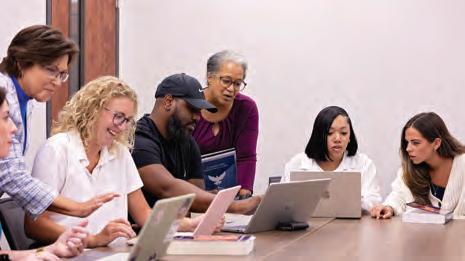
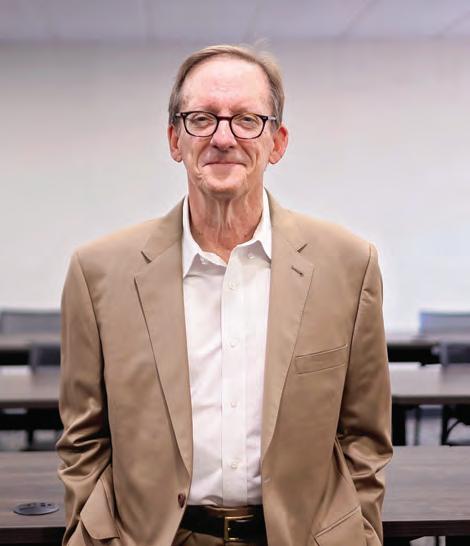
DEAN’S MESSAGE

Another year has passed at Cumberland School of Law, and it has been full of excitement and success. We are almost halfway through our 5 in Five Campaign, and we’ve raised 49% of our $10 million fundraising goal. We are grateful to all the donors and supporters who have so graciously given, including Dee and Sandra Miles with their $1 million gift to our advocacy program and many others mentioned within this issue. We are hopeful that you will help us reach our goal, which will transform and pave the way for several important programs at the law school.
Our advocacy program is ranked 4th in the nation by U.S. News & World Report and 2nd in the national Gavel Rankings. Our teams continue to compete at a high level, and your continued support will help make sure that our resources grow to match the quality of our program and ensure its sustained success. Our clinics continue to expand and offer students experiential learning opportunities while serving our community. The first year of our Medical-Legal Partnership Clinic with UAB Hospital was a success. The Cooney Contracts and Risk Management Clinic is
in high demand by our students, our Veterans Clinic continues to serve veterans in the region, and our criminal clinics (including the Innocence Clinic and the Parole Clinic) help ensure that everyone has access to justice.
The inaugural year of our Cumberland Connection Program was a resounding success. We hosted 14 undergraduate students from nine states to experience a week of law school and become inspired to join the profession. Our Land Use & Natural Resources Law Center launched
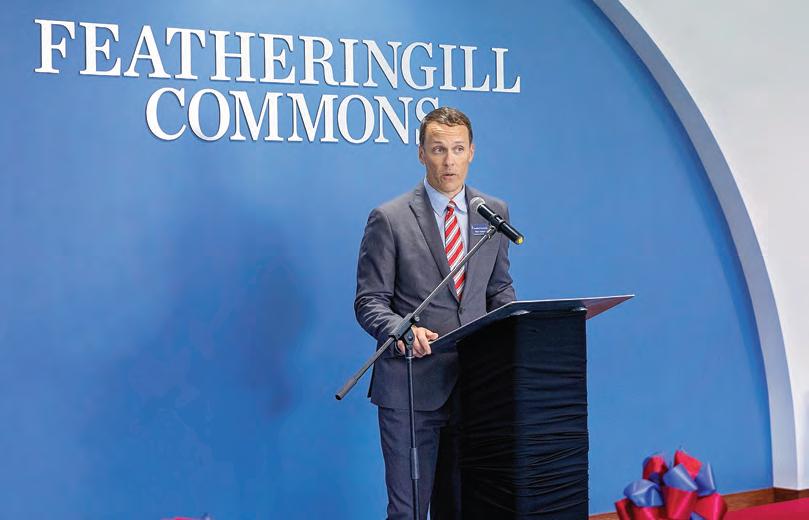
its inaugural summer program in Iceland, and, this month, will host a symposium on "Resilient Futures: The Next Era in Land Use Law." Finally, our Civil Rights Center honored the legacy of alumnus Judge Houston Brown and hosted a talk by Matthew Martens on criminal justice reform. This talk inspired alumna and Samford Board of Trustees chair Judge Karon Bowdre and her husband, Birch, to provide funding to make the talk an annual event.
In addition to these initiatives, our generous supporters are making a difference in our facilities. Professor emerita Carolyn Featheringill provided funding for the renovation of the first floor of the Lucille Stewart Beeson Law Library. The Featheringill Commons will be a transformative classroom and study space for our students for decades to come.
We are grateful for all our alumni and supporters who continue to make Cumberland School of Law a special place to be—for our students, faculty, and staff.

Blake Hudson
Dean and Ethel P. Malugen Chair of Law
Honoring a Legendary Career: JUDGE HOUSTON BROWN
During Black History Month, Cumberland School of Law partnered with the Black Law Students Association and its Civil Rights Center for an event honoring the legendary career of Judge Houston L. Brown, JD ’73.
As one of the first Black graduates of Cumberland School of Law, Brown has been a passionate advocate for both his clients and change in his community. He practiced law in Birmingham from 1973 until he was appointed as a circuit court judge in 2000. He was elected and reelected in this position for three terms and was ultimately elected as presiding judge of the 10th Judicial Circuit of Alabama, making him the first Black presiding judge in Jefferson County.
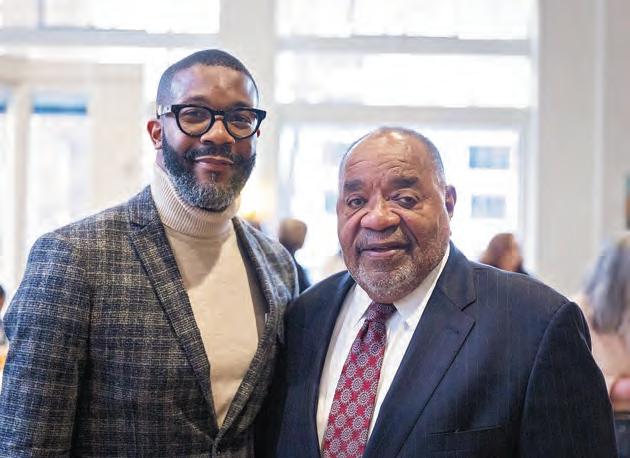
Birmingham, Alabama, Mayor Randall Woodfin, JD '07, and Judge Brown
We were honored to recognize him for his dedication to making the world a better place through compassionate advocacy, for his exceptional ability to seek compromise while staying true to his principles, and for being a remarkable role model for young attorneys following in his footsteps.
JUDGE KARON O. BOWDRE SUPPORTS NEW CRIMINAL JUSTICE REFORM SPEAKER SERIES
In January, Cumberland School of Law welcomed a full congregation in Samford’s Reid Chapel to hear a lecture
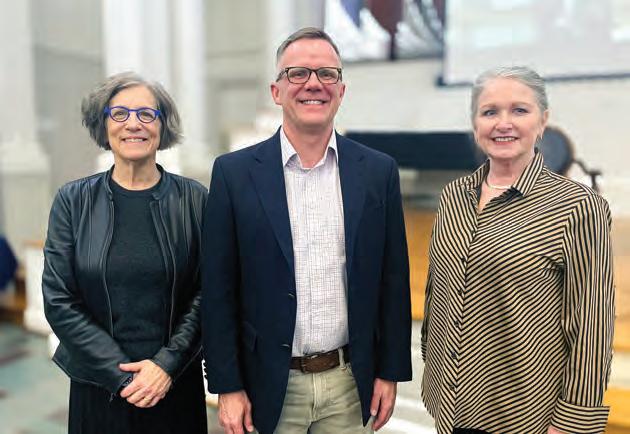
from award-winning author, theologian and former federal prosecutor Matthew Martens, author of Reforming Criminal Justice: A Christian Proposal. Judge Karon O. Bowdre ’77, JD ’80, chair of Samford University’s Board of Trustees and former Cumberland faculty member, has given financial support to ensure the success of a new annual speaker series on the topic of criminal justice reform, particularly as it relates to biblical perspectives.
Associate professor Ramona Albin, who coordinated the 2025 event with Alabama Appleseed Center for Law and Justice said, “Judge Bowdre has been at the forefront in recognizing the moral, ethical and practical imperative of criminal justice reform. This new speaker series furthers that work and allows Cumberland to lead in educating our community about this important issue. We are very grateful for her support of this new initiative.”
The Criminal Justice Speaker Series will become a signature event of Cumberland School of Law’s Civil Rights Center.
Albin, Martens, Bowdre
For Cumberland School of Law to achieve financial stability in critical program areas during the next five years, we need to raise at least $10 million. Launched in 2023, the 5 in Five Campaign aims to raise $2 million in each of five initiatives over five years. The corpus of these endowments will endure, and the expendable revenue generated each year will support programs that dramatically impact our students, community and the legal profession.
1
ADVOCACY AND COMPETITION PROGRAMS
To improve our nationally ranked advocacy program, Cumberland School of Law needs the resources to fully compete with rival programs.
CLINICAL PROGRAMS
2
Clinics offer our students invaluable opportunities to receive practical legal experience while serving our community. Unlike most law schools, Cumberland School of Law does not have a permanent source of funding for our clinics, which is crucial to continuing to expand these opportunities for our students and our community.
4
CUMBERLAND CONNECTION PROGRAM
Funding for the Cumberland Connection Program will allow the law school to expand its applicant pool by developing a formal pipeline for undergraduate students with no family history of legal education or who have overcome financial or other hardships—helping both inspire and offer opportunities to those who may not have confidence that practicing law is within their reach.
LAND USE & NATURAL RESOURCES LAW CENTER
CIVIL RIGHTS CENTER
Birmingham is the birthplace of the Civil Rights Movement. Funding for a Civil Rights Center will set Cumberland School of Law apart by making it a premier educational destination for those passionate about addressing past and emerging civil rights issues.
3
5
Alabama is a state rich in forest, water and other critical natural resources. The Land Use & Natural Resources Law Center at Cumberland School of Law allows our faculty and students to engage directly in legal and policy work related to land use and natural resources development and management.
Thanks to you, we’re stepping closer to our goal. Scan the QR code to support these initiatives today.
$1,265,479
$1,215,095
$1,228,725 $2M GOAL
TOTAL: $4,916,902 OUT OF $10,000,000 (49%)

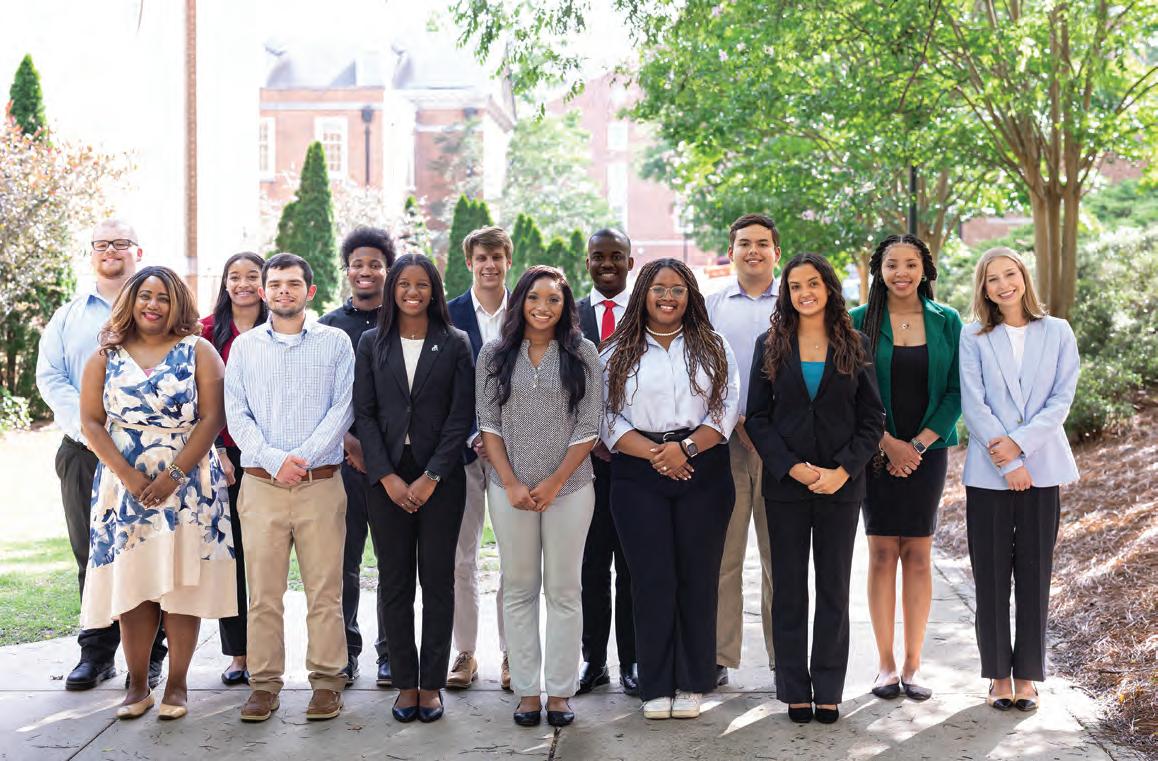
CUMBERLAND CONNECTION PROGRAM INSPIRES UNDERGRADUATE STUDENTS TO PURSUE LEGAL CAREER
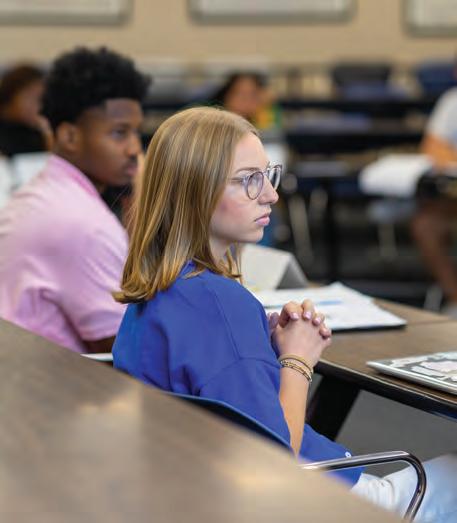
In May, a select group of students from colleges across nine states arrived at Samford for the inaugural Cumberland Connection Program—an immersive, weeklong introduction to law school and the legal profession. The program was created to provide undergraduates who may be interested in law, but are unfamiliar with the profession, with early access to the tools, resources and relationships that support success in legal education.
Funded by alumni and donors passionate about expanding access to legal education, the program included classes taught by Cumberland School of Law faculty, advocacy exercises, leadership development sessions, and panels with practicing attorneys—many of whom have no family history of legal education. Students also gained insight into the law school application process and built a foundation of support that extended beyond the classroom.
“This program was created to make law school feel possible,” said Dean Blake Hudson. “They left with a deeper understanding of the legal field and a community ready to support them.”
One of the students, Ella Ingram, a public health major and political science minor at Samford, found the experience deeply impactful. “I went into it hoping just to gain some insight into law school and the
realities of a legal career, but I came out with a deeper sense of purpose and community than I ever anticipated,” she said. “Every faculty member was incredibly personable, accommodating and authentic. Their willingness to connect with us on a personal level added a cherry on top to the overall experience.”
Beyond academics, the program emphasized mentorship. Participants were paired with current students and alumni, providing them with lasting guidance and support.
For Destiny Gilliard, a senior at Fayetteville State University, meeting her seat sponsor, Nicole Sodoma, JD ’00, founder of Sodoma Law, was a powerful moment.
“The program profoundly shaped my understanding of what a future legal career entails and illuminated the ways law can be used as a tool for social change,” Gilliard said. “Speaking with Nicole about family law and advocacy reaffirmed my passion for supporting vulnerable populations. I am deeply grateful for the encouragement I received throughout this program.”
Sodoma, reflecting on her participation, shared, “Law school can be overwhelming, especially for students without someone to advise them. That’s why programs like this matter. Sponsoring a scholar and sharing the evolution of my own career path as I enter my 25th year was truly an honor. It’s a tradition Sodoma Law looks forward to continuing.”
Another participant, Jorge Avila, a senior at Middle Tennessee State University, said the program strengthened his desire to pursue law as a way to help others. “I was pleased to see that helping the underprivileged was a common value among the attorneys we met. Entering a career in law, I wish to do the same. While I already planned to go to law school, this program made me even more excited for the experience.”
The Cumberland Connection Program affirms the law school’s commitment to increasing representation in the legal field and empowering students with the tools, confidence and connections to succeed.
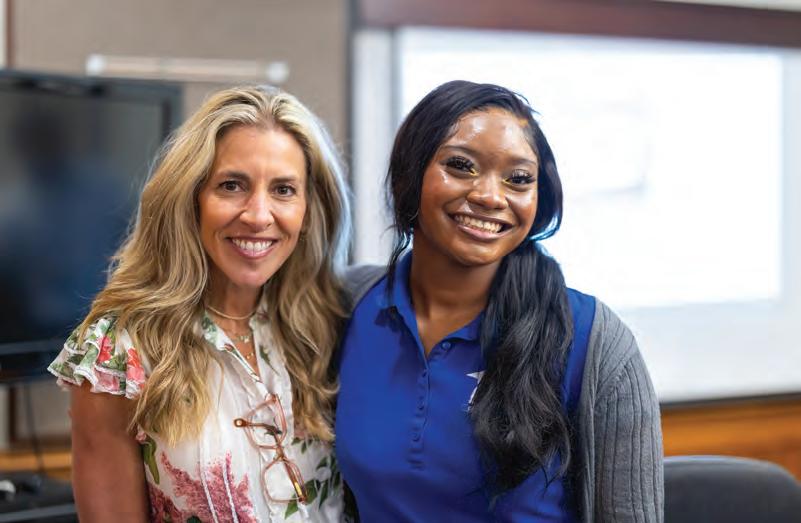
INAUGURAL CUMBERLAND CONNECTION COHORT
Jorge Avila, Middle Tennessee State University, Mann & Potter Scholar
Destiny Gilliard, Fayetteville State University, Sodoma Scholar
Akayla Huges, University of Mississippi, John Carroll Scholar
Ella Ingram, Samford University, Bradley Arant Scholar
Grace Kadia, North Texas University, Sean Modjarrad Scholar
Sean Kirce, The University of Alabama, Scott & Patti Simpson Scholar
Evan Reese Lyas, The University of Southern California, Jeremy Counseller Scholar
Luke Marchetta, Samford University, Bob Stropp Scholar
Noah Sanderson, The University of Alabama, Cumberland Law Scholar
Jacob Slatton, Berry College, Marvin Wilson Scholar
Bryce Surratt, Furman University, Friedman, Dazzio & Zulanas Scholar
Adara Walker, Oakwood University, Leonard Baynes Scholar
Elisa Williamson, Florida State University, Orlando Health Scholar
Sodoma and Gilliard


$1 MILLION GIFT FUELS THE FUTURE of Advocacy at Cumberland School of Law
Cumberland School of Law received a transformative $1 million gift from alumnus Dee Miles, JD ’89, and his wife, Sandra. The gift will directly support the school’s renowned advocacy program, ensuring future generations of law students are equipped to become powerful, ethical advocates in courtrooms across the country.
A nationally respected plaintiffs’ attorney, Miles credits much of his success to the training and mentorship he received at Cumberland. This gift reflects his desire to give back to the institution that shaped his career—and to empower others to follow a similar path.
“For me, advocacy has always meant standing up for those without a voice,” said Miles. “Cumberland gave me the foundation to do that work. Sandra and I are proud to support the program that meant so much to me—and to invest in students who are preparing to serve others through the law.”
The donation will provide enhanced resources for trial advocacy coaching, fund student travel to national competitions and support program growth under the leadership of dedicated faculty and staff. Cumberland’s National Trial Team is consistently ranked among the top in the nation, and its graduates go on to serve as litigators, judges and public servants throughout the legal profession.
Dean Blake Hudson emphasized the long-term impact of the Mileses’ gift. He said, “We are grateful for the Mileses’ support. Their generosity showcases their commitment to advocacy
training, and their gift will provide a pathway for future lawyers to continue advocating on behalf of those in need.”
With this meaningful contribution, the Miles family is helping to preserve and propel a core part of Cumberland’s identity: excellence in advocacy rooted in purpose, preparation and justice.

IN 2025, Cumberland School of Law was ranked 4th in the nation by U.S. News & World Report and 2nd in the Gavel Rankings, both for the trial advocacy program. Cumberland is also ranked 6th in the nation in the American Bar Association’s list of the top law school competition teams in arbitration, negotiation, client counseling, mediation and appellate advocacy. Join the Miles family in supporting the nationally recognized advocacy program.
Professionalism in Practice
JOHN WEST FINDS THE ULTIMATE EXPERIENCE IN CUMBERLAND’S ADVOCACY PROGRAM
For John West, JD ’25, attending Cumberland School of Law was an easy decision. With a clear goal of becoming a trial lawyer, he knew Cumberland’s nationally ranked advocacy program was where he’d receive the best preparation.
“I always knew I wanted to be a trial lawyer,” West said. “When it came down to picking a school, the choice was obvious. This was the place to be.”
That choice paid off. In addition to being part of numerous national trial team accolades, top competition wins and seven national professionalism awards, West was named the Academic AllAmerican Trial Advocate by the National Association of Legal Advocacy Educators. Yet for West, the recognition reflects not just personal accomplishment but the strength of the program and the people behind it.
“Our advocacy program is known not only for its success, but for how we show up—with professionalism and kindness,” he said. “That starts with our coaches. They lead by example and give so much of themselves to help us grow.”
Judge Jim Roberts, JD ’94, director of Cumberland’s national trial teams and interim co-director of advocacy programs, said West exemplifies everything the program stands for.
“John represents the best of our national trial program at Cumberland,” Roberts said. “He is an excellent student who has had tremendous academic success, a selfless servant who has mentored and guided others through their law school careers, and a dedicated, hardworking and talented advocate who has represented our school with dignity, grace and the utmost professionalism. It was my great honor to coach, teach and mentor John these past two years.”
While competitions shaped his legal skills, West said the most lasting impact came from the relationships he built.
“Being part of the advocacy program gave me some of my best friends,” he said. “These are people I’ll stay connected with for life.”
West also expressed gratitude for the donors whose support fuels the program’s success.
“Support like that is fundamental,” West said. “It’s what allows us to travel, compete and continue raising the bar.”
During the 2025-26 term, West is clerking for United States Magistrate Judge Chad W. Bryan in the Middle District of Alabama, with plans to pursue criminal law in government service. Eventually, he hopes to join the U.S. Attorney’s Office.
“Regardless of what I do after my clerkship, Cumberland’s advocacy program has prepared me for it,” he said.”
And when the time comes, he plans to give back.
“I want to be one of those alumni who shows up,” he said. “Whether I’m coaching or just answering questions, I want students to know they’re not alone. That’s the culture here— people pour into you, and you want to do the same.”
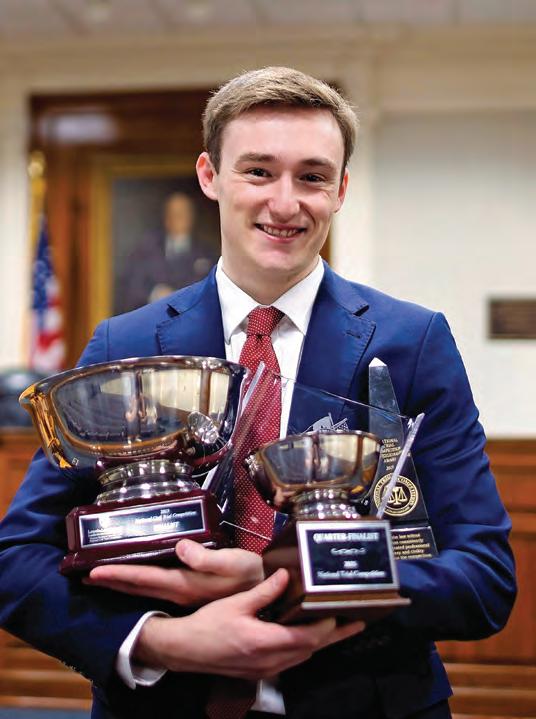
Cumberland School of Law Launches Land Use & Natural Resources Law Center
Cumberland School of Law has launched the Land Use & Natural Resources Law Center, giving students new opportunities to explore careers at the intersection of law, environmental policy, and economic development.
Alabama’s natural resources—forests, rivers, biodiversity and mineral deposits—support multibillion-dollar industries and a growing population. The new center will prepare students to navigate the legal and policy challenges that come with balancing conservation, land development, environmental protection and economic growth.
The center, launched with initial support from Samford University’s Innovation Fund as well as support from individual donors, offers a range of hands-on opportunities for students. These include discipline-specific externships and the new study abroad summer program in Iceland exploring topics like sustainability and geothermal energy. Complementary to the center, Cumberland School of Law students also have access to courses such as Natural Resources Law, Land Use Law, Scientific Evidence, Construction Law, International Environmental Law, and more, which are all part of the school’s course guide for students pursuing a career in environmental law.
The center is led by Dean Blake Hudson, who brings extensive scholarship and experience in environmental and land use law. William Holt, land use planning expert, serves as the associate director. Additional Cumberland faculty and an advisory board of experts from across environmental, business, industrial and real estate sectors also support center programming.
“This center is designed with students in mind,” Dean Hudson said. “Whether they want to work in environmental law, real estate development, public service or nonprofit advocacy, the center offers the tools and training to get them there.”
In addition to course work and experiential learning, the center will host symposia and speaker events on issues such as zoning, climate resilience, housing affordability and state-level environmental regulation. Earlier this year, a symposium brought together experts from across the nation to discuss regulatory alternatives to direct federal environmental regulation.

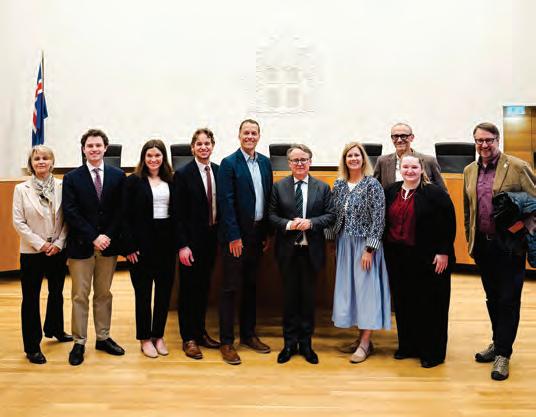
To honor the official launch of the center, Cumberland School of Law hosted an Environmental Law Symposium on Oct. 3, titled “Resilient Futures: The Next Era in Land Use Law” featuring keynote speaker Basil Camu. Camu is the cofounder of Leaf & Limb and Project Pando and the author of From Wasteland to Wonder: Easy Ways We Can Help Heal Earth in the Sub/Urban Landscape.
Meeting with the president of the Icelandic Supreme Court Benedikt Bogason
Visiting a geothermal energy plant in Iceland
FROM LAW SCHOOL TO THE COURTHOUSE
CUMBERLAND GRADUATES EARN PRESTIGIOUS CLERKSHIPS
For a select group of Cumberland School of Law students, the first stop in a legal career will not be a law firm or a business or a district attorney’s office but a judge’s chambers in a courthouse. Recent graduates have once again secured highly competitive judicial clerkships, continuing Cumberland’s tradition of placing graduates in these formative positions.
• Richmond Maddox, JD ’25, will clerk for U.S. Bankruptcy Judge Chris Hawkins in the Middle District of Alabama
• John West, JD ’25, will clerk for Magistrate Judge Chad W. Bryan in the Middle District of Alabama
• Taylor Neill, JD ’24, will clerk for Senior Judge Ed Carnes of the U.S. Court of Appeals for the Eleventh Circuit
• Brian Belveal, JD ’25, will serve a two-year position in the Staff Attorney’s Office of the U.S. Court of Appeals for the Eleventh Circuit
• Jacob Powell, JD ’25, will serve with Chief Justice Sarah Stewart of the Supreme Court of Alabama
• Victoria Stocks, JD ’25, will clerk for Judge Terry Moore of the Alabama Court of Civil Appeals
• Madison Clark, JD ’25, will clerk with Judge Matt Fridy of the Alabama Court of Civil Appeals
“During my time at Cumberland, I’ve been fortunate to have had amazing mentors,” Jacob Powell, JD '25, said. “In fact, I know that I’ve learned from the best—both inside and outside the classroom. I’m excited to continue learning from Chief Justice Sarah Stewart, and I’m confident that my experiences at Cumberland have prepared me for the job.”
In recent years, Cumberland alumni have earned federal and state clerkships, from trial courts to supreme courts.
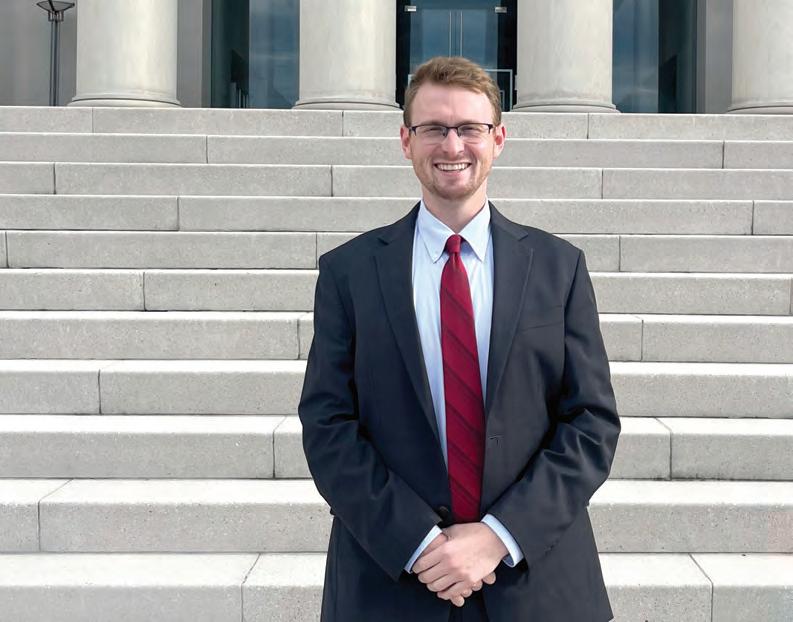

Cumberland School of Law faculty and staff advisers encourage students to consider judicial clerkships and provide assistance in preparing application materials.
TO LEARN MORE, CONTACT JEFF ANDERSON, JUDICIAL CLERKSHIP COORDINATOR, AT JANDER14@SAMFORD.EDU, OR PAIGE YARBROUGH, DIRECTOR OF CAREER DEVELOPMENT, AT PAPRITCH@SAMFORD.EDU.
Powell pictured at the Supreme Court of Alabama
Real Clients, Real Impact
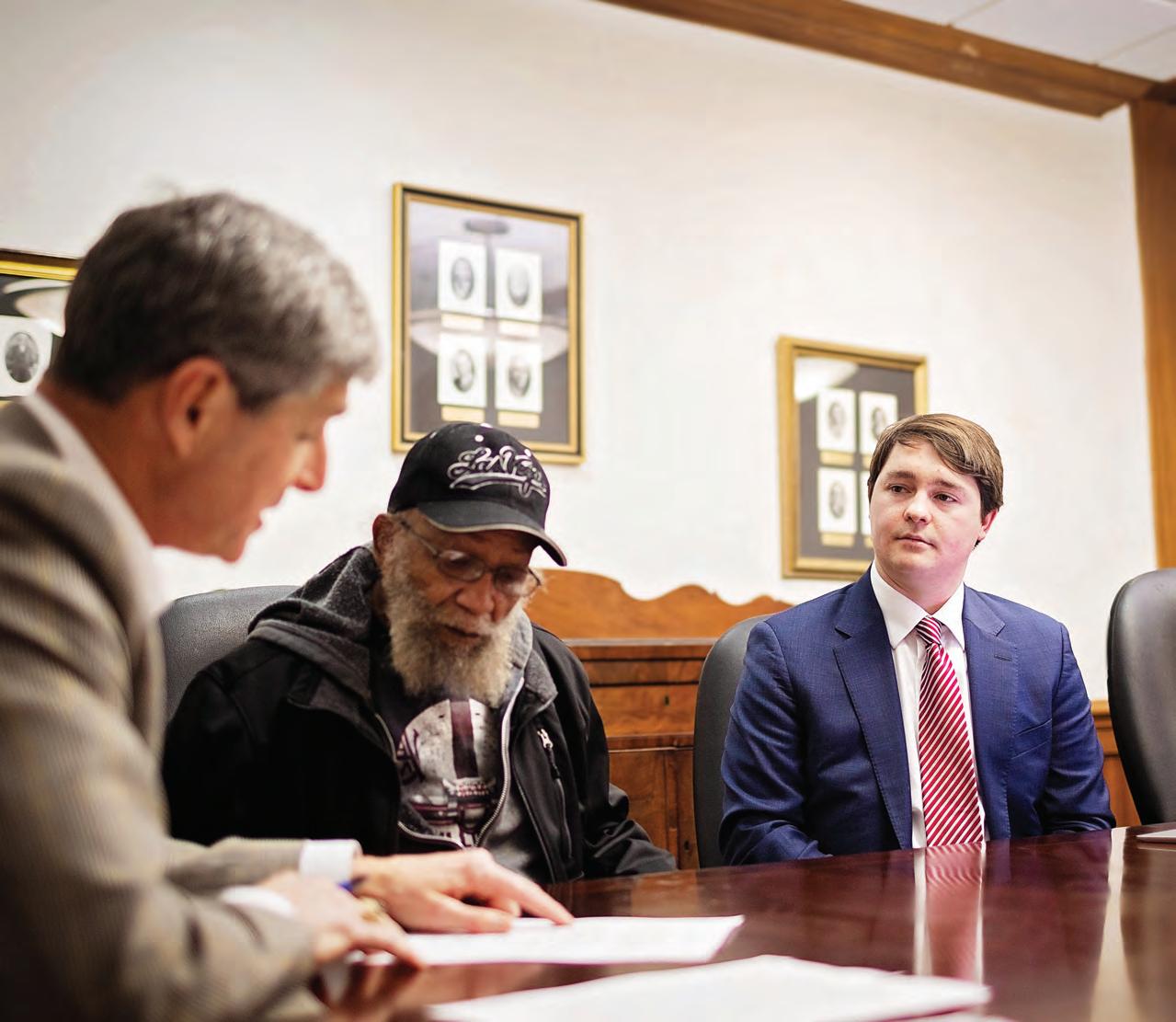
At Cumberland School of Law, the classroom is just the beginning. Through its thriving clinical program, the law school prepares students for real-world practice while expanding legal services within the state of Alabama.
These clinics—offered as academic courses for credit—give upper-level students the opportunity to engage directly in legal work under faculty supervision. They apply their training to real cases with real clients, and the results speak for themselves.
Rachel Martin, JD ’13, serves as the director of clinics, externships and public interest, where she oversees Cumberland’s clinical and externship programs and develops
opportunities for students to engage in meaningful public interest work. In this role, Martin works to enhance experiential learning opportunities, connect students with real-world legal practice, and foster partnerships with public interest organizations.
“Clinics are a bridge between legal education and real-world law practice,” Martin said. “Unlike classroom hypotheticals, real
cases are rarely linear or simple. Clinics expose students to the challenges of representing clients in matters impacting their livelihoods, homes and freedom. Through clinics, students cultivate their professional identity as service-oriented lawyers and gain confidence in their skills. Because of this, our clinics have exploded in popularity with the students over the past few years, and we are grateful for the support we’ve received that has allowed us to continue expanding our clinical offerings.”
Each year, Cumberland’s clinics impact hundreds of lives while shaping the professional identity of the students who participate. Since its launch in 2020 by the late Judge John L. Carroll, JD ’74, nearly 900 veterans have received assistance through the Cumberland Veterans Legal Assistance Clinic (C-VETS).
Assistant professor Kevin Patton, a U.S. Navy veteran, now leads the C-VETS clinic as the supervising attorney. “Cumberland does a wonderful job of preparing students with the substantive law they’ll need when they graduate, but we also know you learn by doing,” Patton said. “It’s invaluable, I believe, for our students to have these types of experiences under their belt before they even leave the doors of the law school.”
Kaitlyn Boswell, who is serving this year as the inaugural C-VETS student fellow, said, “The clinic has allowed me to expand my legal skills and knowledge while making a real impact in the community. It has been an extremely rewarding experience to work alongside other student advocates, professors and community partners to assist veterans in need.”
That spirit of service runs through every clinical offering. On the criminal side, students participate in trial and post-conviction work through the Capital Defense, Criminal Appeals, Innocence, and Parole clinics—tackling complex and often life-altering cases. These clinics have produced not just courtroom-ready graduates but young lawyers with a deep appreciation for due process and the value of access to justice.
LaJuana Davis, the Judge J. Russell McElroy Professor of Law, has been involved with the clinics since their inception. Before joining academia, she worked with the Equal Justice Initiative in Montgomery, specializing in direct appeals and habeas litigation—experience that is central to the Cumberland Innocence Clinic’s success. According to Davis, Alabama is the only southeastern state without a dedicated innocence
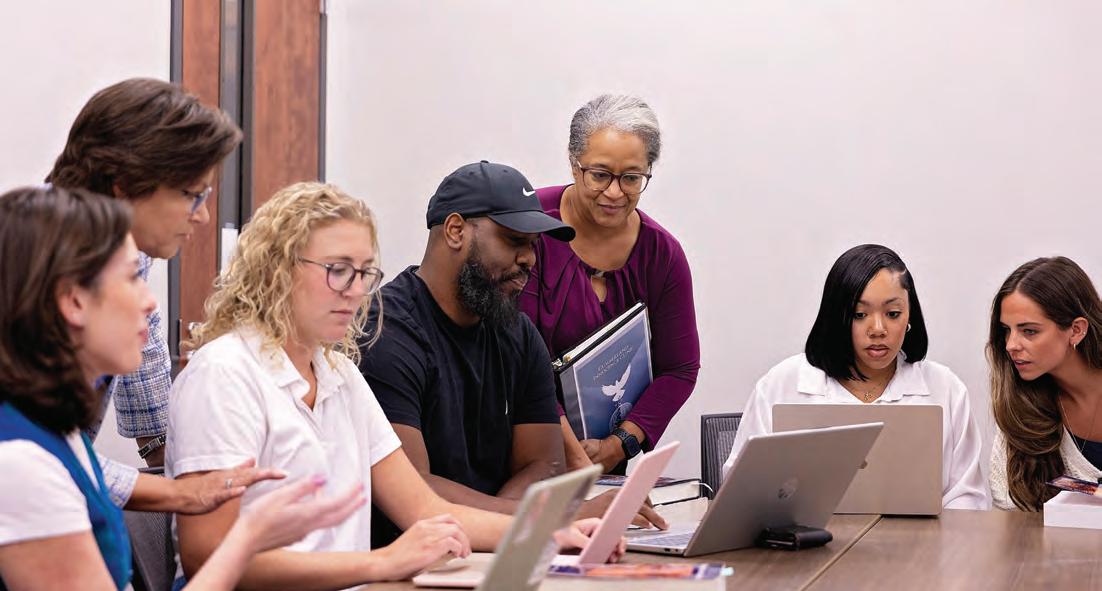
LaJuana Davis and Leslie Coyne with students in the Innocence Clinic class
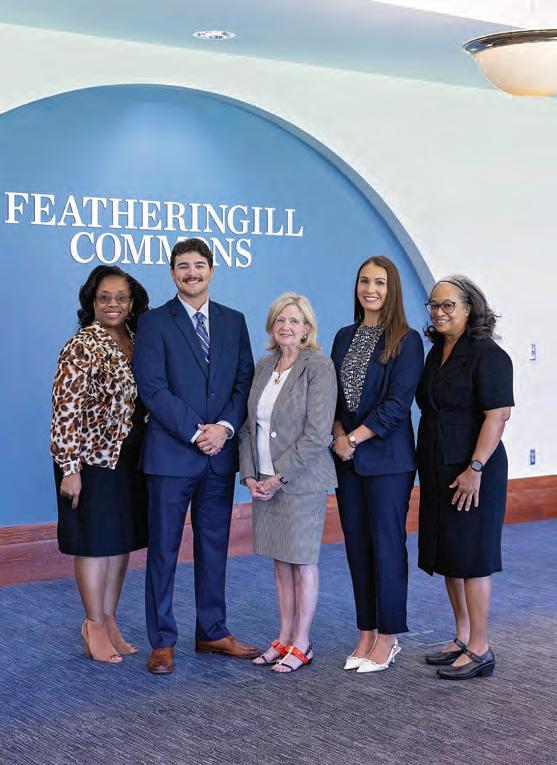
organization. Under her leadership, alongside clinical adjunct instructor Leslie Coyne, JD '99, Cumberland School of Law fills this gap with the only law school clinic in Alabama focusing on noncapital prisoner innocence claims.
“There is widespread agreement that innocent people should be able to prove their innocence. Doing so in Alabama is harder than in most states,” Davis said.
The Cumberland Innocence Clinic appeals to students who have a personal interest in pursuing criminal justice reform and to those seeking a better understanding of the criminal justice system from either the prosecution or defense perspective. The clinic’s small size provides a unique opportunity for supportive partnerships, allowing the clinic to provide critical access to legal services for those unable to pay for them.
In reviewing innocence claims, students bring fresh eyes to old cases—analyzing legal records, identifying overlooked facts and navigating procedural barriers. Through this process, they gain insights into how the justice system functions and where it falls short.
“In conducting case analyses, the students gain an understanding of how the justice system works; what, if any bias currently exists; what, if any, bias previously existed; what claims of actual innocence have been exhausted; what claims, if any, remain; how to present those claims; how to deal with the court and opposing counsel; and how to deal with the expectations of the victim, the incarcerated person, and that person’s support system,” Davis said.
In addition to C-VETS, the Innocence Clinic, the Capital Defense Clinic and Criminal Appeals Clinic, newer clinics are extending Cumberland’s reach even further. Launched in fall 2023, the Cooney Contracts and Risk Management Clinic pairs students with McGriff, a global insurance brokerage, to work on contract drafting and risk assessment. The aforementioned Parole Clinic, also launched in 2023 in partnership with the nonprofit Redemption Earned, prepares incarcerated clients for parole hearings and gives students the chance to advocate before the Alabama Parole Board.
Launched in 2024, the Medical-Legal Partnership (MLP) Clinic at UAB Hospital connects students with physicians and social workers to address the legal needs of patients. This interdisciplinary model exposes students to the social determinants of health and the legal issues that often arise alongside them. Cynthia Ransburg-Brown, JD ’98, university counsel in the Office of Counsel at UAB Health System, was instrumental in helping launch the clinic for the law school.
According to Ransburg-Brown, social issues can impact a patient’s overall recovery and often increase their length of stay in the hospital, and legal issues often arise from social challenges. “The program’s goal is to have the law students interact directly with patients who are referred to the MLP for legal assistance,” she said. “Participating in direct, one-on-one patient/client counseling is an invaluable experience for any law school student. It prepares students to engage with their own clients in the future, even if the future legal topics are unrelated to health care issues. Being able to learn what your client needs and delivering a professional service, in any legal specialty, is the foundation of a good and long-lasting attorney-client relationship.”
To help continue the incredible work of our legal clinics, we need your support. Scan to give to the Clinical Programs Fund at Cumberland School of Law.
Cynthia Ransburg-Brown, Eric Posas, Leslie Barineau, Nadia McDonald and LaJuana Davis
“I am consistently impressed with Cumberland students,” Ransburg-Brown added. “Even though the students are meeting patients during a difficult time, the students are respectful, thoughtful and genuinely interested in addressing and resolving the patients’ legal concerns. They are keenly intelligent, quick to identify pertinent issues, and suggest appropriate alternatives.”
Third-year students Nadia McDonald and Eric Posas both participated in the MLP clinic in the spring. "Being part of the Medical Legal Partnership at UAB was an invaluable experience," McDonald said. "It gave me the opportunity to work directly with real clients and see how legal advocacy can make a tangible difference in people’s lives. I found it incredibly rewarding to use the skills I’m developing in law school to help people who are truly in need."
As alumnae, both Ransburg-Brown and Leslie Barineau, JD ’85, who teaches the clinic, are proud to give back to their alma mater to help enhance the student experience. “As a Cumberland graduate and adjunct professor, it is extremely important to be a part of an interesting and engaging educational experience,” Ransburg-Brown said.
Cumberland’s expanding clinical opportunities reflect the law school’s enduring commitment to producing not only capable advocates but also compassionate, service-driven leaders. For alumni who once walked these halls with dreams of making a difference, the clinical program proves those dreams are alive—growing with every case taken, every life changed, and every student empowered.
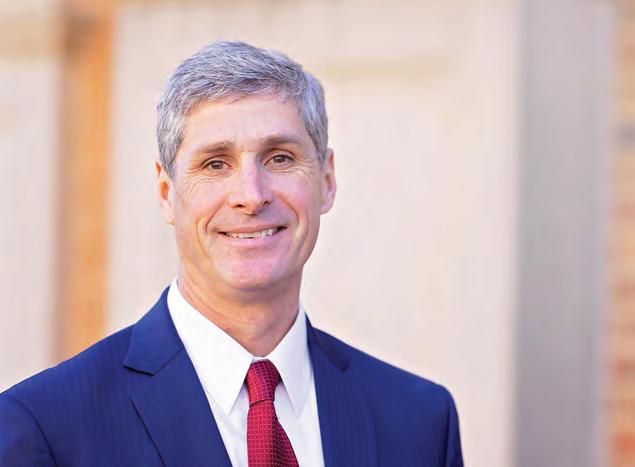
Kevin Patton was recently hired as the first full-time assistant clinical professor of law to lead the Cumberland Veterans Legal Assistance Clinic.
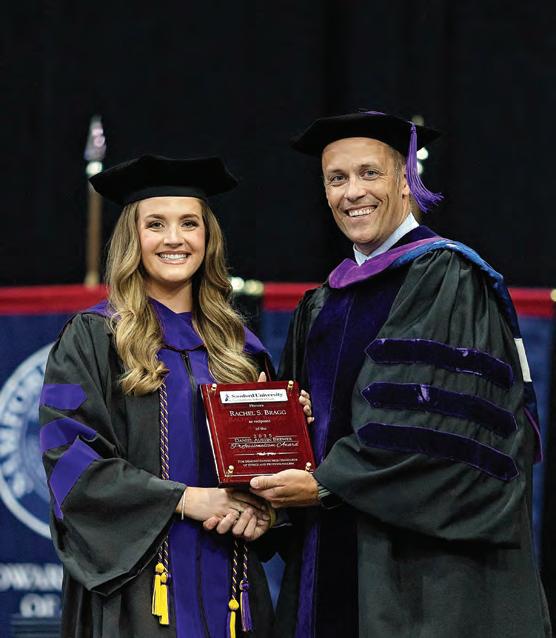
Bragg Receives Brewer Professionalism Award for Work with C-VETS

During Cumberland School of Law’s spring commencement ceremony, Rachel Bragg, JD ’25, was awarded the Daniel Austin Brewer Professionalism Award. Established by Governor Albert P. Brewer in honor of his father, the award recognizes a member of the graduating class who exemplifies the highest standards of ethics and professionalism in the legal profession.
Bragg, who was deeply involved in the Cumberland Veterans Legal Assistance Clinic (C-VETS), was recognized for her outstanding commitment to serving veteran clients. She drafted wills, powers of attorney and advanced health care directives; guided veterans through expungement processes; advised on government benefits and personal injury claims; and provided counsel on tax matters. Nominators praised her “can-do” attitude and ability to offer encouragement and clarity to those navigating legal obstacles.

SCAN TO WATCH an interview with her about the work of the clinic:
Featheringill Commons Opens in Law Library, Honoring Beloved Professor’s Enduring Legacy
When students returned to Cumberland School of Law for the fall semester, they were welcomed by a newly reimagined space at the heart of the law school experience. On Aug. 13, the law school held a ribbon-cutting ceremony to open Featheringill Commons, a renovated space within the Lucille Stewart Beeson Law Library that honors longtime professor Carolyn Burgess Featheringill.
The updated commons on the first level of the library was made possible by a lead gift from Featheringill herself. Timed to coincide with the library’s 30th anniversary, the renovation marked the latest chapter in her long legacy of dedication to Cumberland’s students and the broader legal community.
Sam and Susan Nicholson also contributed generously to the development of this new space. Sam, JD ’78, attributes his success as a trial lawyer to the advocacy training he received at Cumberland. The Nicholson's gift will make a positive impact, especially in the Cumberland Advocacy Program, by
supporting functional classroom space that faculty use for advanced advocacy training, within Featheringill Commons.
Said Featheringill, “I’ve always believed the spaces where students gather should be comfortable, welcoming and worthy of the work happening within them.”
That belief dated back to the early 1990s, when she chaired the committee that selected the original furnishings for the library before it opened in 1995. At the time, faculty were invited to weigh in on the proposed interior design. Working alongside
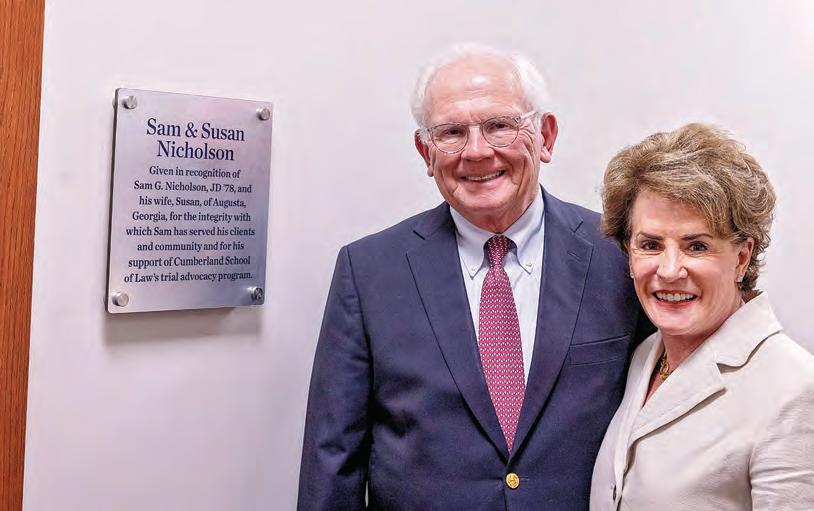
colleagues, Featheringill helped select the carpeting, chairs and other furnishings with one core principle in mind: creating a space that students would want to use.
“At that time, if you were going to do legal research, you had to come to the library. Of course, we had Westlaw and LexisNexis, but it wasn’t on our phone because we didn’t have cell phones,” she said. “So, we were determined to make it a place where people felt comfortable being. That mattered to me then, and it matters to me now.”
The newly renovated Featheringill Commons builds on that legacy with a focus on modern student needs. Designed to foster connection and community, the space features collaborative areas and four new classrooms equipped with state-of-the-art technology. Two of the classrooms can be combined into a single space accommodating up to 140 students or divided for smaller groups. The common area serves as both a collaborative study zone and a flexible meeting space. In addition to regular class use, the classrooms will host a variety of events—from orientation sessions to academic conferences. The space has a beautiful new entrance from Robinson Hall’s angel patio, providing improved access to the library itself. The space was created to be both functional and inspirational—just as Featheringill envisioned the origins of the library decades ago.
Sam, JD '78, and Susan Nicholson generously supported classroom space within the new Featheringill Commons.
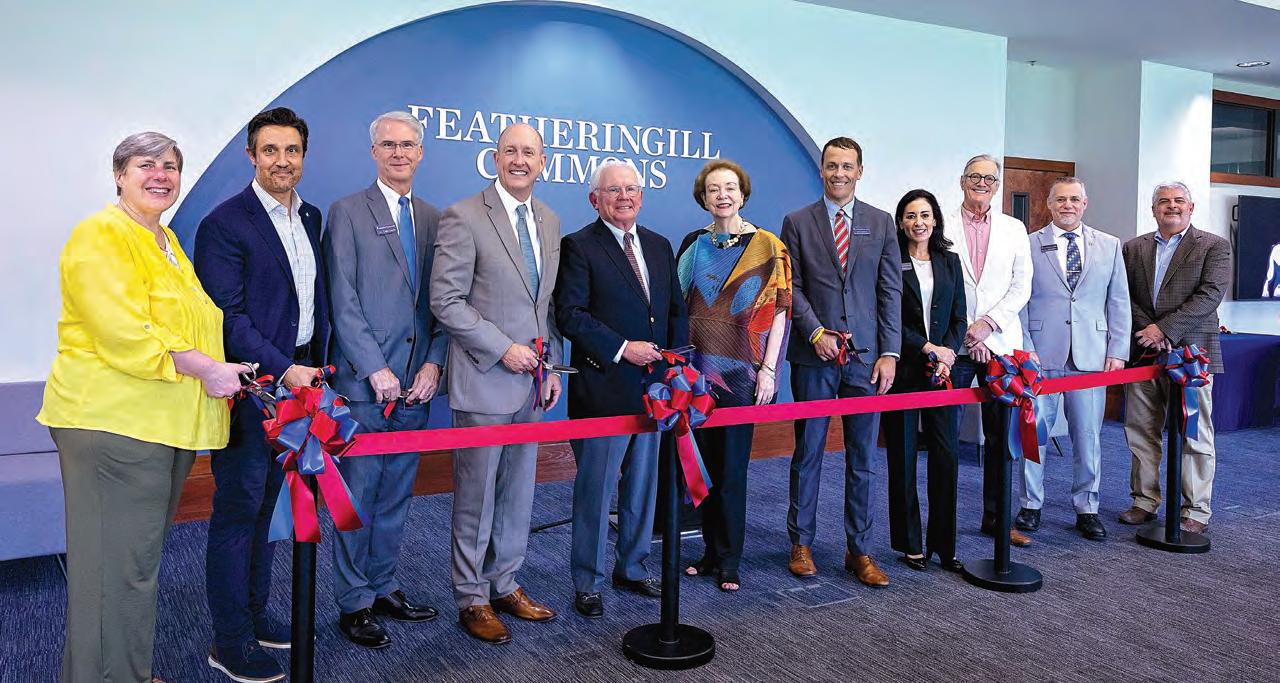
“In honor of her extraordinary vision and generous support, we are proud to open this newly renovated space in the name of professor emerita Carolyn Featheringill,” said Dean Blake Hudson. “This reimagined space within the law library creates exciting possibilities—including much-needed additional classrooms and the capacity to host networking events, legal conferences, and symposia—enhancing both the student experience and Cumberland’s visibility in the broader community.”
Throughout her career, Featheringill distinguished herself as a legal scholar, teacher, mentor and advocate for generations of Cumberland students. She credits her late husband, Bill Featheringill, for encouraging her to join the faculty in 1979.
“Bill knew Dean Corley and wanted me to meet with him when a faculty position came open, thinking I may enjoy teaching. Although I was expecting our daughter at the time, I agreed,” she said.
Her daughter Elizabeth, "Liz", was born in September 1978, and Carolyn joined the faculty the following January as an adjunct professor. The next fall, she became a full-time faculty member, where she taught
wills, trusts and estates courses to several thousand Cumberland students until she retired in 2003.
Her commitment to student success, both inside and outside the classroom, helped shape the culture of Cumberland—one that prioritizes relationships, professionalism and service.
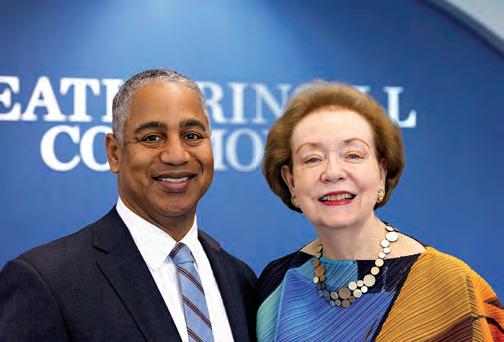
“Professor Featheringill radiated warmth and positivity in the classroom, visibly delighting in those ‘lightbulb’ moments when a student finally grasped a complex legal concept,” said Featheringill’s former student Robin Andrews, JD ’91, now an assistant professor of legal research and writing at Cumberland. “She was beloved by her students because we knew she genuinely celebrated our successes and valued the relationships she built with each of us. That same generous spirit is evident in her gift to the law school.”
“We are tremendously grateful for Carolyn’s support of this enhanced new space in the law school,” said Betsy Holloway, vice president for university advancement and
marketing and longtime friend of Carolyn and her family. “Her vision for a space that fosters connection, learning and community is exactly what Featheringill Commons now represents. Through this space, we are honored to help ensure her legacy continues to inspire generations of Cumberland School of Law students in the years ahead.”
As the law school celebrated the opening of the commons, Featheringill was proud to be part of something that would serve students for years to come, hoping it would improve their learning experience and enhance opportunities to build relationships with professors.
“Helping with this new space has been a full circle for me,” she said. “Being involved in the original library and now having the opportunity to help reimagine it for a new generation is really special.”
Featheringill with former student Mark Debro, JD '99, at the opening of Featheringill Commons.
FACULTY UPDATES
Denning Receives 2025 Cooley Book Prize from Georgetown Law’s Center for the Constitution
Brannon P. Denning, Starnes Professor of Law, received the 2025 Thomas M. Cooley Book Prize from Georgetown Law’s Center for the Constitution. The annual award recognizes exceptional books and their authors that advance our understanding of and commitment to the Constitution.
Denning was recognized alongside his co-author, Robert J. Cottrol, for their work, To Trust the People with Arms: The Supreme Court and the Second Amendment. Published in October 2023 by the University of Kansas Press, the book examines the historical, legal and cultural underpinnings
of the Second Amendment, offering an in-depth exploration of the Supreme Court’s evolving jurisprudence surrounding the right to keep and bear arms. Their work provides a balanced and scholarly treatment of a deeply contested constitutional issue, situating the Second Amendment within broader questions of liberty, government power and historical interpretation.
“I am grateful and humbled to share this award from the center with my friend and co-author Bob Cottrol,” Denning said. “It is especially flattering to receive an award
Bianca Evans to Lead Community Outreach Efforts
Dr. Bianca Evans joined the Cumberland School of Law faculty this year as the director of community outreach. An Alabama native and first-generation college graduate with 18 years of
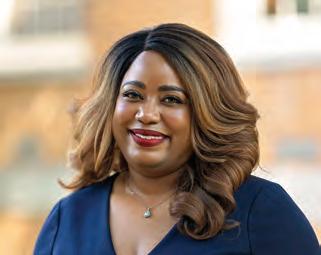
experience in higher education, Evans brings a wealth of knowledge and strong commitment to expanding access to legal education and strengthening community connections within the legal profession. In this role, she will lead the law school’s community engagement strategy, oversee key academic pipeline initiatives such as the Cumberland Connection Program, Pre-Law Advisers Conference, outreach ambassadors and support recruitment and outreach programming nationwide.
Previously, Evans held leadership roles at

previously given to my idols of constitutional scholarship.”
Denning was previously the recipient of the 2023 Thomas W. Woolley Scholarly Achievement Award given by Samford University.

the University of Florida, Indiana University and Auburn University, where her responsibilities included designing and implementing recruitment and retention initiatives for faculty, staff and students and instructing courses in anatomy and physiology, bioethics and psychology. Evans is passionate about educational access, having obtained more than $3.7 million in funding to promote student success.
Evans holds a PhD in educational psychology from Auburn University, an MBA from Indiana University’s Kelley School of Business, a MS in biology from Alabama A&M University, and a BS in biology from Tuskegee University.
Center Director Randy Barnett, Denning, Robert J. Cottrol
The Immigration Conversation We Should Be Having
by Maryam T. Stevenson, assistant professor of law
Immigration. It’s a simple word—one that most view as an easy issue because it is a policy area that generates an initial gut reaction. Most people hear the word immigration and immediately view it as a positive or a negative thing. Gallup, which has been polling Americans since 1939 on important issues facing the nation, added immigration to its list in 1993. Unsurprisingly, immigration has topped the list multiple times since then. Immigration has been framed and largely viewed by the public, political elites and the media as a border security and undocumented problem. In reality, however, it encompasses so much more. And the entire system is broken—for several reasons.
After just a few days in my immigration law class, students begin to realize that immigration is not an easy issue, but instead, one that is hard and complex, spanning various federal agencies and various policy issues, including economic, humanitarian and sovereignty issues. It’s also a moral and spiritual test as people of faith are called to build communities of care. And it impacts the productivity and social fabric of our nation.
My most recent article, for example, discusses how our broken immigration system impacts Americans’ access to health care. Our health care system currently has a shortage of more than 20,800 primary care physicians and 37,000 total physicians. These numbers are expected to double by 2036. In 1994, Congress recognized this shortage and created a program that allowed foreign physicians to remain in the U.S. after completing a residency or fellowship training program if they agree to work in a medical facility located in a federally designated medical shortage area. Since then, however, the immigration process for foreign physicians has become more arduous and lengthier despite our country’s growing need for providers. In many cases it may take a foreign physician up to 15 to 20 years to obtain citizenship.
Immigration is far from a one-dimensional issue. The issue of foreign physicians serves as just one striking example of how our outdated and fractured system not only fails the immigrants within it, but the Americans who rely on them. This is the immigration conversation we should be having.

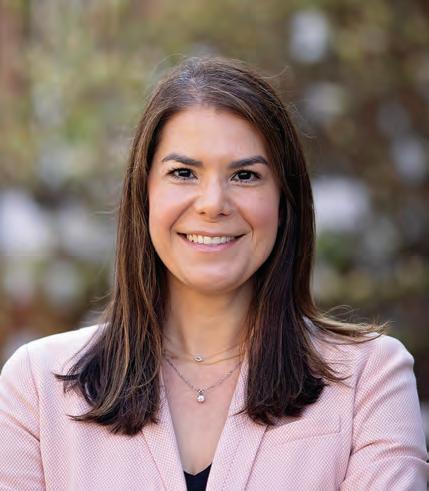
MARYAM T. STEVENSON teaches courses related to administrative law, torts, professional responsibilities, immigration law, mental health law, and food and drug law. Prior to teaching, Stevenson specialized in physician and health care immigration. She has represented Fortune 500 companies, universities, medical groups and medical research facilities, as well as extraordinary researchers in health care and academia.
Her recent articles include:
“Doctor, Doctor: Reforming Physician Immigration Policy to Improve Access to Healthcare”, forthcoming in the Georgetown Immigration Law Journal
“What Congress Needs to Break the Immigration Reform Stalemate”, Catholic University Law Review (fall 2024)
“Explaining the Comprehensive Immigration Reform Stalemate in Congress”, Catholic University Law Review (summer 2024)
FACULTY PUBLICATIONS
In addition to their dedication to teaching and mentoring, Cumberland School of Law faculty contribute scholarly work for legal publications across the globe. A few recent faculty publications include:
JEFF ANDERSON
“Writing for Expert Readers,” Journal of Appellate Practice and Process (2024)
CARLISSA R. CARSON
“Restoring the Balance of War Powers: A Call to Repeal and Replace the 2001 Authorization for Use of Military Force,” San Diego Law Review (2025)
“Conflicting Canons of Construction: The Aftermath in Veterans’ Law,” Brooklyn Law Review (2025)
LAJUANA DAVIS
Postconviction Remedies casebook, co-author (fall 2025)
BRANNON P. DENNING
The Glannon Guide to Constitutional Law, 4th Edition (2025)
To Trust the People with Arms: The Supreme Court and the Second Amendment (with Robert J. Cottrol) (2023)
Winner of the 2025 Thomas M. Cooley Book Award from the Georgetown Law School’s Center for the Study of the Constitution
United States v. Rahimi: Five Takes, with Glenn H. Reynolds, Houston Law Review (forthcoming)
“Judges, Guns, and MAGA,” Duke Law Journal (2025)
“Trouble’s Bruen: The Lower Courts Respond,” with Glenn H. Reynolds, Minnesota Law Review (2024)
“Privacy and Autonomy Post-Dobbs,” Mississippi Law Review (2024)
ALICIA GILBERT
“Frenemies: Why the FTC Should Explore the Utility of State COPAs to Address Anticompetitive Consolidation in Healthcare,” Louisiana Law Review (2024)
“340B: The Shoulder of Frankenstein’s Monster,” Harvard Journal on Legislation (2023)
BLAKE HUDSON
"Resilient Forest Management and Climate Change," Georgia Law Review (2024)
LAYNE KEELE
“Only Mostly Dead: How the Irreparable Injury Rule Can Protect the Jury Trial Right for Claims in Restitution,” Oklahoma Law Review (2025)
“To Err Is Human, To Restore Is (Usually) the Law: Present Entitlement in the Discharge-for-Value Rule in Restitution,” Arkansas Law Review (2024)
TIM MCFARLIN
“Infringing Uses, Not Works,” South Carolina Law Review (2024)
CHINELO DIKÉ-MINOR
“Be Careful What You Wish For: An Overreliance on Telemedicine Could Harm Health Equity,” Annals of Health Law and Life Sciences (2024)
TRACEY M. ROBERTS
“The Tax Trench Deepens,” Florida Tax Review (2025)
“The Long and Winding Road: The Inflation Reduction Act’s Energy and Environmental Tax Credits,” with Robert F. Mann, National Tax Journal (2025)
DAVID M. SMOLIN
“Suicide, Suicidality, and Pediatric Medical Transition in United States v. Skrmetti and Beyond,” Harvard Journal of Law & Public Policy: Per Curiam (April 2025)
“Reparation and Conversional Justice in the Catholic Church’s Response to Sexual Abuse of Minors and Vulnerable Adults,” Plenary Assembly of the Pontifical Commission for the Protection of Minors (March 2025)

BILL HOLT JOINS LAND USE & NATURAL RESOURCES LAW CENTER
Dr. William “Bill” Holt joined Cumberland School of Law as the associate director of the new Land Use & Natural Resources Law Center.
Holt brings a unique blend of academic and practical experience to the role. He holds degrees from the University of Georgia, Georgia Tech, Yale University and Vermont Law School, with specialties in geography, city planning, urban sociology and environmental law.
Before joining Cumberland, Holt served on the faculty at Birmingham-Southern College, where he led community-focused environmental initiatives and helped redesign interdisciplinary programs. His work has earned multiple honors, including
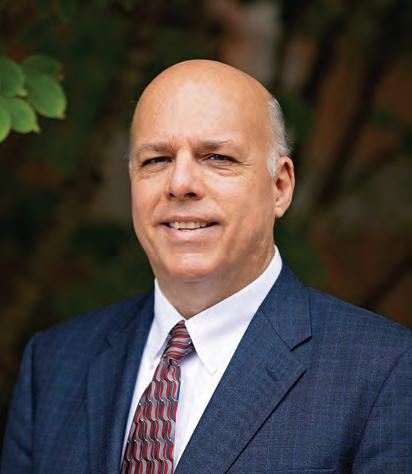
recognition on the Urban Affairs Association’s Distinguished Service Honor Roll at the International Conference on Urban Affairs in Vancouver, British Columbia, Canada in April.
At Cumberland, Holt will support the center’s mission to train future lawyers in environmental, land use and natural resources law, with a focus on experiential learning and community impact.
For lawyers
Concentrations:
• Financial Services Regulatory Compliance
• Higher Education Law and Compliance
• Health Law and Compliance
• Legal Operations
100% online
Complete in 24 months
CUMBERLAND SCHOOL OF LAW
TEACHING LEGACY
MIKE DEBOW RETIRES AFTER 36 YEARS

After more than 36 years of dedicated service, professor Mike DeBow retired from Cumberland School of Law in December 2024, closing a chapter that has left a lasting mark on generations of students and colleagues.
Following his graduation from Yale Law School, DeBow began his career in private practice in Washington, D.C., followed by a judicial clerkship with Judge Kenneth W. Starr of the U.S. Court of Appeals for the District of Columbia Circuit from 1983-84. DeBow then served as a legal adviser to Federal Trade Commission chairman James C. Miller III (1984-85) and a special assistant to assistant attorney general Douglas Ginsburg in the Antitrust Division of the U.S. Department of Justice (1985-86).
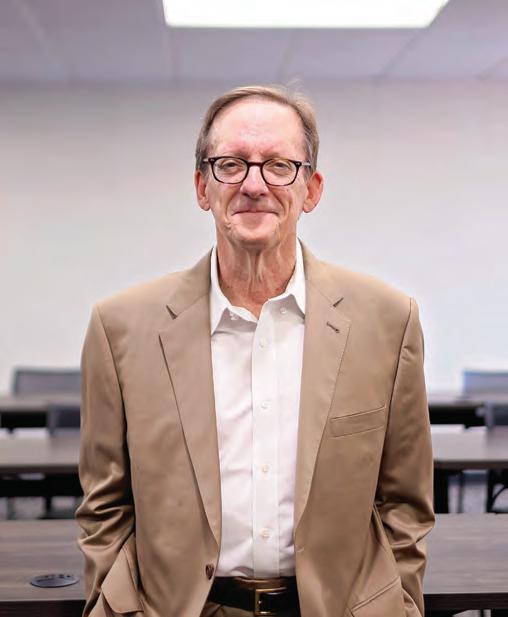
DeBow began his teaching career at the University of Georgia Terry College of Business, where he taught for two years before coming to Cumberland School of Law in 1988. “If you do the arithmetic, you will find that I had been a member of this faculty for 36 and one-half years when I retired last December,” he said. “I can’t quite believe it myself.”
Over the decades, DeBow became a cornerstone of the Cumberland community—for his scholarly rigor and teaching, and also his enduring commitment to students and colleagues. “Cumberland has been a wonderful place for me,” he said. “The school’s great strength is its people—students, staff and faculty. I doubt there is a more supportive law school environment anywhere.”
DeBow built his academic career around the legal foundations of the market economy. He taught Business Organizations every year and, since 1994, taught Property. These, along with Contracts, form what he calls “the core of the law of capitalism,” essential to both economic prosperity and legal practice.
“I tried to focus my Business Organizations and Property classes on the business lawyer’s key function,” he explained, “helping clients identify potential problems in advance, negotiating an acceptable solution and drafting the legal documents to implement the solution.” He credits former faculty colleague Tom Stone for many helpful discussions that shaped his approach.
Beyond the core curriculum, DeBow taught a wide range of electives: Administrative Law, the pre-1L summer Legal Process course, Legislation, and Local Government. Including courses in Cumberland’s online compliance program, he estimates he taught at least 184 courses. He also led or co-taught 15 courses in
DeBow
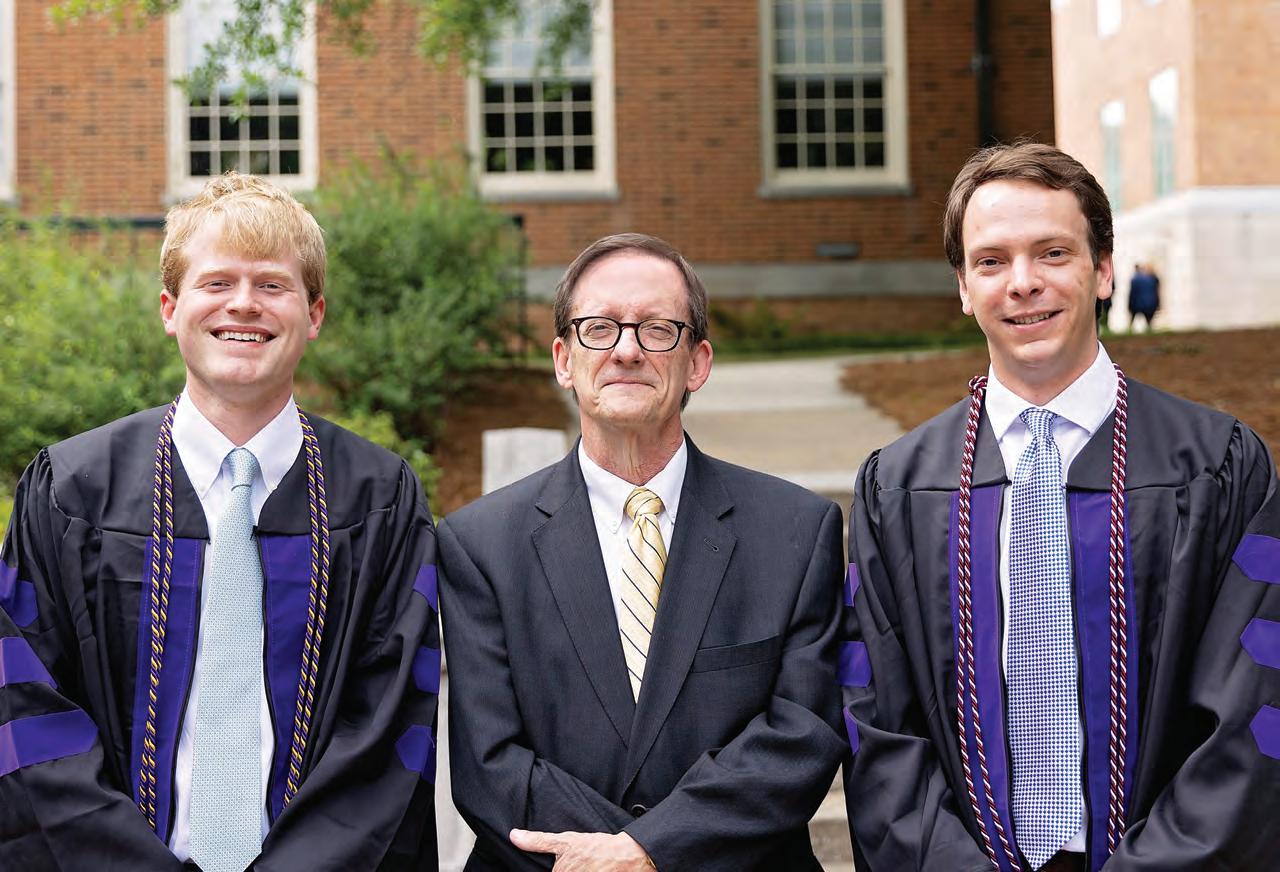
Samford’s Brock School of Business, political science department and honors program.
To mark his retirement, the Cumberland Law Review published two articles by DeBow: “Capitalism for Law Students” and the forthcoming “Public Policy for Law Students.” Each blends teaching notes and handouts from his classes—particularly Property, Business Organizations, Administrative Law and Compliance. “If you had me for any of these courses,” he said, “the articles will sound familiar.”
DeBow expressed deep appreciation for the students he taught over the years. “It has been my great honor to teach Cumberland students,” he said. “It was also a lot of fun.”
Among his fondest memories are landmark cases that sparked lively class discussion: Tulk v. Moxhay and Village of Euclid v. Ambler Realty in Property, Meinhard v. Salmon and Dodge v. Ford Motor Co. in Business Organizations, Florida East Coast Railroad in Administrative Law, and Hunter v. City of Pittsburgh in Local Government.
Honoring his success in the classroom and the broader academic community, DeBow was named the Stephen Everett Wells Professor of Municipal Law at Cumberland in 2018 and was named a fellow of the Manuel H. Johnson Center for Political Economy at Troy University in 2021.
Though now retired, DeBow remains eager to hear from former students and welcomes updates on their lives and careers.
As Cumberland School of Law celebrates DeBow’s remarkable career, his legacy continues in the thousands of students he taught—and in the solid legal foundation he helped them build.

“If you do the arithmetic, you'll find that I had been a member of the faculty for 36 and one-half years when I retired last December. I can't quite believe it myself.”
– Mike DeBow
Edward Gaal, JD '24, Professor DeBow, Porter Simpler, JD '24
DISTINGUISHED ALUMNI AWARDS 2025

Each year, we are honored to recognize our accomplished alumni through our Distinguished Alumni Awards. The 2025 award recipients are:
Distinguished Alumnus of the Year: WAYNE MORSE, JD ’76
Given to an alumnus/na who has distinguished himself/herself in the practice of law, service to the community and leadership in the profession
Young Alumna of the Year: AVERIE
ARMSTEAD,
JD ’19
Given to an alumnus/na who graduated within the past 15 years and who has distinguished himself/ herself in the practice of law, service to the community and leadership in the profession
Volunteer of the Year: VIC
HAYSLIP,
JD ’85
Given to an alumnus/na who has demonstrated exceptional loyalty and commitment to Cumberland School of Law through volunteer service to the school
Friend of Cumberland: JIM NOLES
Given to a friend, although not a graduate, who has contributed time and resources to enhance the quality of the law school and the educational experience of the students
Distinguished Alumnus of the Year
WAYNE MORSE, JD ’76
Wayne Morse “never had a bad day at Cumberland.” In the mid-70s, Morse explained, Cumberland had the best possible educators for aspiring lawyers: Frank Donaldson, a drafter of the Alabama Rules of Civil Procedure , Charles Gamble, author of the treatise on the Alabama Rules of Evidence, and contracts scholar Brad Bishop. During his time as a student, he made lifelong associations and friendships, including ones with Charlie Waldrep and Mike Kendrick with whom he has practiced law for decades.
Morse is a partner and trial lawyer at Waldrep, Stewart & Kendrick, LLP. He has litigated in trial and appellate courts in Alabama, Mississippi, Arkansas, Tennessee and Georgia. His practice involves commercial, employment and civil rights cases. He is a fellow in the College of Labor and Employment Lawyers, the American Bar Foundation and the Birmingham Bar Foundation.
As a longtime Cumberland advocate, Morse is involved with raising support for Cumberland’s advocacy program. He has judged mock trials and authored “Death Actions for Federal Rights in Alabama,” which was published in the Cumberland Law Review. Morse funds a book scholarship in honor of his late father, Hoss Morse, U.S.M.C., which is given to a deserving student who served in the military.
Morse was counsel to Tarrant in Jefferson v. City of Tarrant , 522 U.S. 75 (1997) and to Cory Maples in Maples v. Thomas , 565 U.S. 266 (2012), a landmark due process decision

holding that Maples, convicted of murder and facing a death sentence, must have another opportunity in court because of lawyer abandonment.
“Serving at Cumberland has been gratifying, allowing me to be of use and to stay connected to an institution to which I owe everything,” Morse said. “Cumberland has had success, but I am confident we will see the plans of the indefatigable and visionary Dean Blake Hudson accomplished and expectations exceeded. Cumberland is and will be even more so, a top tier law school.”
Young Alumna
of the Year AVERIE ARMSTEAD, JD
'19
Averie Armstead is an associate at Starnes Davis Florie, LLP, where she is an employment litigator, collegiate sports attorney and professional liability and higher education adviser. She represents both public and private employers and universities.
A proud graduate of Cumberland School of Law, Armstead has remained deeply connected to the Birmingham legal community. She completed the Birmingham Bar Association’s 2024 Future Leaders Forum, and she was recognized by the National Black Lawyer’s “Top 40 Under 40” for the state of Alabama consecutively for two years. Armstead currently serves on the Young Supporters Board of the O’Neal Comprehensive Cancer Center at UAB, where she was recently honored with the director’s award in recognition of her outstanding leadership, service and commitment to cancer awareness and fundraising initiatives.
Armstead’s professional excellence is matched by her heart for service and mentorship. She is passionate about empowering the next generation of legal professionals, and she continues to invest time mentoring young lawyers and aspiring
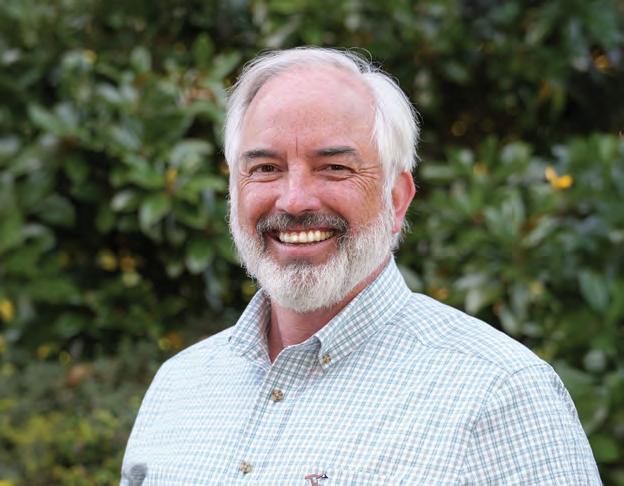
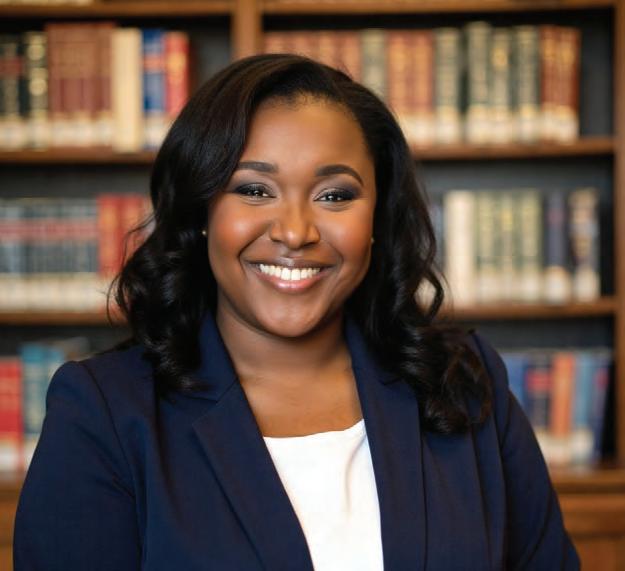
law students. This is evidenced by Armstead’s service as the mentoring co-chair of the James Edwin Horton Inn of Court, an adjunct professor at Cumberland, and member of the core leadership team of the city of Birmingham’s women’s initiative.
While a student at Cumberland, Armstead was senior class president, a member of the American Journal of Trial Advocacy, a Judge Abraham Caruthers fellow, a member of the career services advisory board, graduate student council representative, an admission ambassador, and a leader in the Student Bar Association. Cumberland imparted in Armstead a commitment to servant leadership and a love for litigation.
Friend of Cumberland
JIM NOLES
Jim Noles is a professor of practice in Auburn University’s College of Forestry, Wildlife and Environment, where he leads the school’s environmental law minor program. Prior to teaching, Noles practiced environmental law as an associate and equity partner with Balch & Bingham and then as a founding partner of Barze Taylor Noles Lowther (BTNL), where he continues to serve as of counsel.
Since arriving in Birmingham in 1997, Noles has built lasting connections with Cumberland and its students
Volunteer of the Year
VIC HAYSLIP, JD ’85
Vic Hayslip has made a lasting impact on Cumberland School of Law through decades of leadership, service and unwavering commitment. A partner at Burr & Forman, LLP, Hayslip leads the firm’s commercial litigation practice group. With 21 offices across the Southeast, as well as in Chicago and Washington, D.C., Burr & Forman has benefited greatly from Hayslip’s efforts to recruit top talent from his alma mater.
Hayslip played a key role in founding the James Edwin Horton Inn of Court at Cumberland, serving on the original executive committee alongside former dean John Carroll. Through that initiative and others, he has worked tirelessly to support Cumberland students and young lawyers. He also spearheaded fundraising efforts among Cumberland alumni at Burr & Forman for many years.
In a meaningful tribute to his class, Hayslip helped establish and raise funds for the Class of 1985 Scholarship, further demonstrating his dedication to supporting future generations of Cumberland lawyers. His influence also extends to campus culture—he was instrumental in founding the Federalist Society chapter at
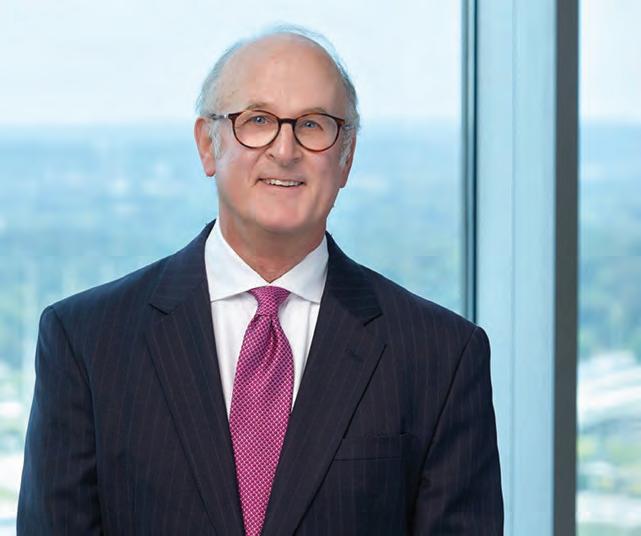
Cumberland, encouraging robust legal debate and intellectual engagement.
Originally from Tuscaloosa, Hayslip moved to Birmingham in 1982 to attend Cumberland. He and his wife, Barbara, continue to be valued members of the Cumberland community.
through professional development, mentorship and recruitment efforts. At Balch & Bingham and later at BTNL, he championed student hiring and growth, especially for Cumberland students. His service on the Alabama State Bar’s environmental law section executive committee also reflects his commitment to students, supporting scholarships that allow them to attend the annual conference and explore careers in environmental law.
He has served as a guest speaker on the topic of professional responsibility for Cumberland’s first-year students and contributed articles to the Cumberland Law Review and
the Journal of the Legal Profession . In 2023, he secured the former U.S. Ambassador to Kuwait, Jordan and Saudi Arabia as the guest speaker for the annual Cordell Hull Lecture Series. Beyond the law school, Noles has served on Samford’s leadership council in support of the Alabama Governors School.
A U.S. Army veteran, his commitment to public service has continued locally as he has led the boards of the Alabama Humanities Foundation, the Alabama School of Fine Arts and the Mountain Brook Library Foundation.
MAJOR GENERAL BOBBY CHRISTINE APPOINTED TOP LEGAL OFFICER FOR U.S. ARMY Alumni News & Notes
Major General Bobby Christine, JD ’95, has been confirmed as the 43rd Judge Advocate General—the top legal officer—for the United States Army. This role places him at the forefront of legal counsel for the Army, guiding its leaders and supporting its mission to defend the nation.
Christine’s career reflects a profound commitment to service. “I am proud to have helped clients, from the powerless to the powerful, in private practice and government service,” he said. “Serving causes greater than oneself is a blessing.”
As the senior uniformed lawyer in the Army, and as head of the Judge Advocate Generals (JAG) Corps, Christine serves as the legal adviser to the Secretary of the Army, the Chief of Staff of the Army, and facilitates delivery of legal services to all officers and agencies of the Army through the uniformed and civilian members of the JAG Corps. He guides the Army through its transformation into a future-ready force while ensuring it remains equipped to deter adversaries today. Christine views this dual mission as both a significant challenge and a profound honor, focused on strengthening leadership and soldier readiness.
Christine credits Cumberland’s legal education and practical litigation training for his diverse career, which spans roles as a twotime United States Attorney, elected District Attorney, magistrate judge, private practitioner, military officer and Judge Advocate.
“What I learned at Cumberland formed the basis of every legal experience that followed
graduation,” he said. “The legal excellence of a legion of respected alumni who preceded me in the profession, both in and out of uniform, set a foundation and opened doors for me.”
For students considering military service, Christine emphasizes that a legal education sharpens critical skills like research, writing and public speaking, essential for navigating complex operational environments. Army Judge Advocates, serving as both soldiers and lawyers, play a pivotal role in global security through military justice, international law and cyber law.
The Cumberland community, ranked 5th nationally for Best Quality of Life by the Princeton Review , fostered lasting relationships for Christine. Engaging with talented classmates and serving as class president and in the Student Bar Association built invaluable bonds. Social moments also created a lifelong network he has relied on in challenging legal environments.
Christine advises law students to treat their degree as a toolkit for leadership and problem-solving, while also stressing the importance of physical and mental fitness to endure the demands of a legal career. Early, repeated practice, he said, builds critical experience and perspective.
“Remember that your time in law school is an investment in your future. Invest wisely. It’s important to prioritize developing a comprehensive core of legal skills. While honing your core lawyering skills—mastering legal research and precise writing—and seizing opportunities like moot court and mock trial
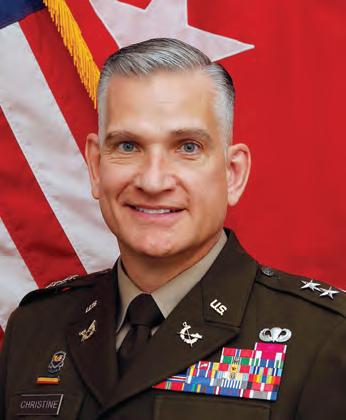
to sharpen your oral advocacy and build unwavering confidence, remember to cultivate a holistic approach,” Christine said.
With his prestigious military career, Christine reflected on Cumberland’s Veterans Legal Assistance Clinic (C-VETS). “The Cumberland Veterans Legal Assistance Clinic can be a lifeline for the veteran community, removing barriers to justice for veterans facing financial hardship,” he said. “Such support can prevent minor legal challenges from spiraling into crises, fostering stability and dignity for those who have served.”
Reflecting his personal opinion, and not making an official Army endorsement, Christine said C-VETS provides students with meaningful opportunities to build connections, cultivate empathy and honor veterans’ sacrifice.
The C-VETS clinic is just one example of how experiential opportunities at Cumberland School of Law prepare graduates like Christine for impactful careers.
Learn what Cumberland lawyers are doing in Alabama, across the nation and around the globe.
1970s
Jimmy Rane, JD ’71, was appointed to serve on the Alabama Growth Alliance, an initiative aimed at supporting economic growth and innovation efforts.
Stan Starnes, JD ’72, was named to the Birmingham Business Hall of Fame.
Frank Plummer, JD ’73, received the North Carolina Bar Association’s Liberty Bell Award, recognizing individuals who exemplify lifelong service to the law.
1980s
Judge Don Davis, JD ’81, retired in January after serving 24 years as the probate judge and chief election officer of Mobile County, Alabama.
Forrest Latta, JD ’83, received the Alabama Defense Lawyers Association’s Louise and Ed Livingston Award for 40 years of exemplary service and dedication to the organization.
Wendy Brooks Crew, JD ’83, is the president of the U.S. Chapter of the International Academy of Family Lawyers.
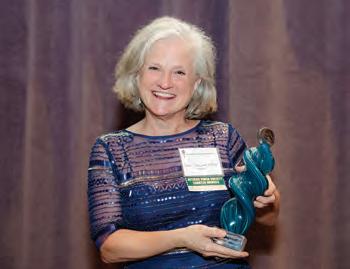
Mary Margaret Bailey, JD ’83, received the Alabama Law Foundation's inaugural Excellence Award, honoring her exceptional service toward advancing the mission of the foundation to expand access to justice in Alabama. Bailey was also the recipient of the Mobile Bar Association Women Lawyers' Section Trailblazer Award.
Maj. Gen. Janet Cobb (ret.), JD ’84, was inducted into the Army ROTC Hall of Fame which honors graduates of the Army Reserve Officers’ Training Corps who have distinguished themselves in military or civilian pursuits.
Ralph Bishop, JD ’84, joined the board of directors for Alabama Children First.
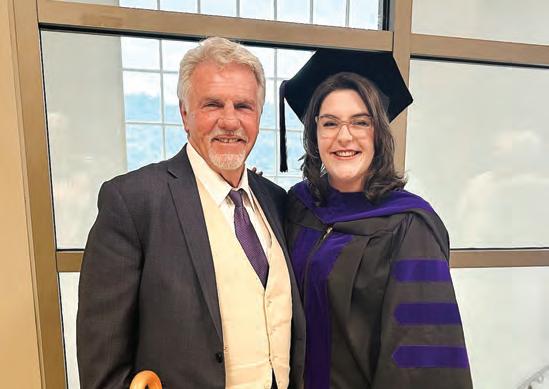
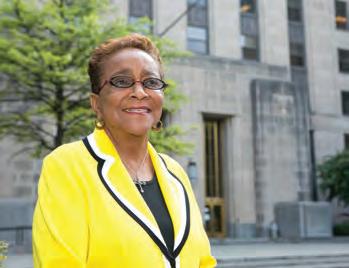
Judge Helen Shores Lee, JD ’87, was posthumously inducted into the Alabama Women’s Hall of Fame in March.
Judge James Y. Ross , JD 87, received the Sharon G. Lee Award of Excellence at the 2024 Annual Tennessee Municipal Court Judges Conference.
Judge Edward H. Merrigan Jr., JD ’88, retired from the U.S. Army as a two-star general after 31 years of distinguished military service. He was appointed to the bench in 2009 by fellow Cumberland alumnus and then Florida Governor Charlie Crist, JD ’81. Judge Merrigan also presides in Veterans Court, a 17th Judicial Circuit problem-solving court he founded in 2012, which assists eligible veterans who are suffering from substance abuse or mental health issues.
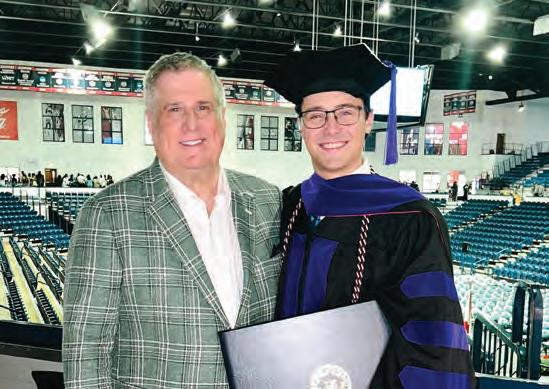
Savannah Aldridge with her father, Daniel Aldridge, JD ’84
Alex Gulas with his father, Ike Gulas, JD ’89
Alumni News & Notes
1990s
Robert Aderholt, JD ’90, continues to serve as chairman to the U.S. House of Representative’s Labor, Health and Human Services, Education and Related Agencies subcommittee.
Louis E. Hatcher, JD ’90, is the vice president of Legal & Strategic Affairs for Sunrise Children’s Services in Mount Washington, Kentucky.
Scott Harmon, JD ’91, was named the chief of the Hillsborough County (Florida) State Attorney’s Office’s major crimes unit.
Judge Darrell Hill, JD ’91, was appointed to the 20th Judicial Circuit Court of Florida.
Judge Ted Schubert, JD ’92, was appointed as an administrative law judge by the Virginia Workers’ Compensation Commission.
Judge Melissa Gifford Hise, JD ’93, was appointed as a superior court judge for the Lookout Mountain Judicial Circuit in Northwest Georgia.
Judge James H. Roberts Jr., JD ’94, was reelected to the Sixth Judicial Circuit Court in Tuscaloosa, Alabama.
Col. Frank Coppersmith, JD ’94, was appointed to the Texas Department of Information Resources. Coppersmith was also named to the Class of 2024 Future Texas Business Legends and received the 2024 Miller Family Future Texas Legend Veteran Award.
Kile Turner, JD ’94, is a member of the American College of Coverage Counsel.
Brian Turner, JD ’95, was selected as a fellow of the American Academy of Matrimonial Lawyers.
Jana Garner, JD ’97, is president-elect of the Alabama State Bar for 2025-2026.
Patrick Flynn, JD ’98, was nominated to serve on Georgia’s state Judicial Nominating Commission.
Courtney French, JD ’98, was elected to serve a six-year term on the Jefferson County Judicial Commission.
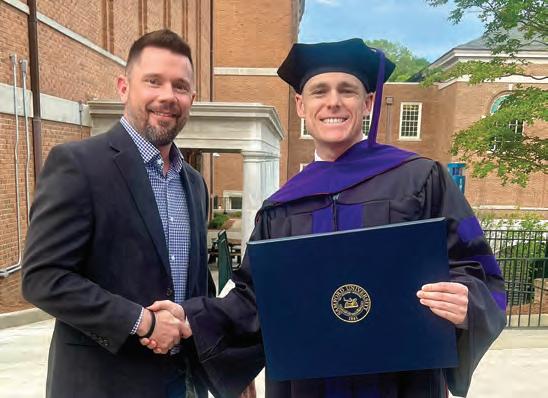
Judge James Hulsey, JD ’98, was selected as president of the American Theatre Organ Society's Atlanta chapter.
Mark Debro, JD ’99, was elected as secretary-treasurer for the Alabama Defense Lawyers Association.
Judge Nichole Carswell, JD ’95, is the superior court judge of the Mountain Judicial Circuit of Georgia.
2000s
Robert Maddox, JD ’00, was elected to the American College of Consumer Financial Services Lawyers Board of Regents.
Col. Joshua D. Rosen, JD ’00, retired after 26 years of service in the U.S. Marine Corps and U.S. Air Force. He retired as a colonel in the U.S. Air Force, having last served as a two-time chief district military judge for the Air Force Trial Judiciary. He was appointed as an administrative law judge by the secretary of the interior in November 2024 and resides in Salt Lake City, Utah.
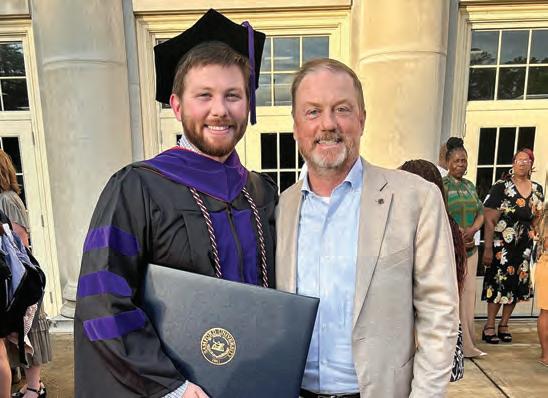
Blake Cordova with his cousin, Jeremiah Rogers, JD ’09
Will Kirkpatrick with his father, Bo Kirkpatrick, JD ’93
Submit your news at samford.edu/law/update-your-info.
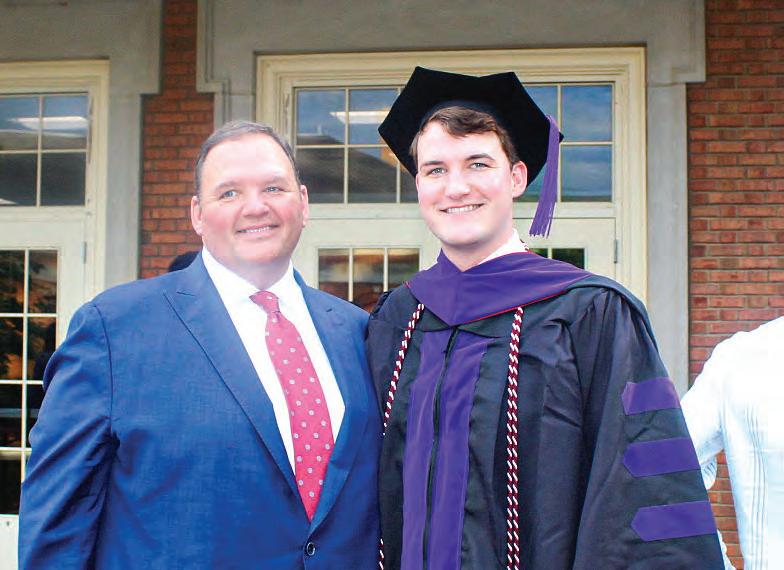
Danny Ellis, JD ’00, was elected as president of the Tennessee Trial Lawyers Association.
Justice Bill Lewis, JD ’03, was appointed to serve on the Supreme Court of Alabama. Prior to joining the state’s highest court, Lewis served in many roles including his service on the Alabama Court of Civil Appeals and as the presiding judge for Alabama’s 19th Judicial Circuit. In August 2025, during the production of this publication, Justice Lewis was nominated as a candidate for the federal bench.
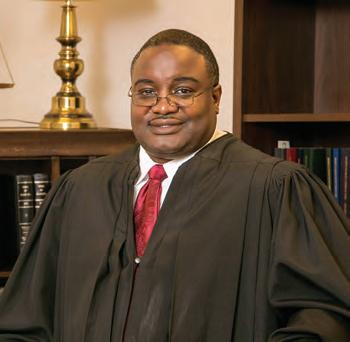

Judge Scott Brewer, JD ’00, was selected as district judge for place #1 of Alabama’s 29th Judicial Circuit.
Amy Hampton, JD ’00, was named managing counsel in Vanderbilt University Medical Center’s Office of Legal Affairs.
Nicole Ramos Jones, JD ’00, was selected to the Florida Real Estate Appraisal Board.
Judge Matthew Haynes, JD ’00, was unanimously voted by the Virginia General Assembly as general district court judge for the state’s Accomack and Northampton Counties.
Tiffany Johnson Cole, JD ’01, joined the Alabama A&M University Board of Trustees.
Judge Tess Percy Stromberg, JD ’01, was elected to the Louisiana Court of Appeals First Circuit, where she will serve a 10-year term. She previously served two consecutive terms as a 23rd Judicial District Court judge for the State of Louisiana.
Judge Tracy Smith, JD ’00, was appointed to the circuit court in Bay County, Florida.
Steven Hall, JD, MSEM ’06, was named executive director of the CRAFT Foundation. Hall was the former assistant deputy commissioner of agriculture for the state of Florida.
Carolyn Lam, JD ’06, is general counsel for Europe at Ecobat, while continuing as global chief compliance officer, based in Dallas, Texas.
Bains Fleming, JD ’07, is the presidentelect of the Alabama Defense Lawyers Association.
Randall Woodfin, JD '07, was elected to his third term as the mayor of Birmingham, Alabama.
Jared Kerr, JD ’08, is president of the Consortium of Academic Programs in Clinical Research.
John Ellis, JD ’09, is general counsel for the Cancer Prevention and Research Institute of Texas.
Lisha Graham, JD ’09, was accepted to be a member of the Federation of Defense and Corporate Counsel.
Richmond Maddox with his father, Robert Maddox, JD ’00
Ally Walker with her mother, Kim Walker, JD ’92
Alumni News & Notes
2010s
Joshua Hornady, JD ’10, was selected as a fellow of the Construction Lawyers Society of America.
Andrew Brashier, JD ’10, was named the director for the Anglican Office of Education, Training, and Formation. Additionally, he was appointed by Archbishop Steve Woods to serve on the Governance Task Force of the Anglican Church in North America.
Noel Bagwell, JD ’12, published Lead Again: A Modern Guide to Resilience, a guide for leaders who have suffered a significant personal or professional setback, offering them a path from setback to comeback. Bagwell is a partner with Industria Business Lawyers based in Washington, D.C.
Cline Thompson, JD ’13, joined the minor league baseball team, the Rocket City Trash Pandas, as vice president of sales.
Charlie Pond, JD ’14, joined Innovate Alabama as its executive director.
Rachel Pitts, JD ’16, is vice president and Compliance Counsel & Data Privacy officer at EBSCO Industries in Birmingham, Alabama.
Katy Reed, JD ’16, was named chief executive officer at Encompass Heath Rehabilitation Hospital of Cypress in Houston, Texas.
Catherine Reaves, JD ’16, is vice president of Policy and State Affairs at Alabama Port Authority in Mobile, Alabama.
Britton O’Shields, JD ’16, has been hired to serve as the lead attorney for the Council on American-Islamic Relations in their newly created Alabama satellite office.
Hilaire Armstrong ’12, JD, MBA ’16, is the director of the Alabama State Bar’s Volunteer Lawyers Program.
2020s
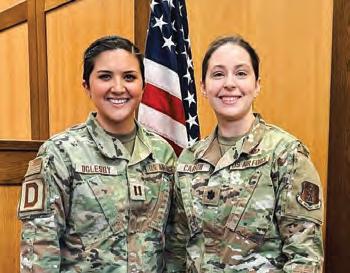
Capt. Dana Oglesby, JD ’21, is the chief of adverse actions for the 100th Air Refueling Wing Legal Office and is stationed at RAF Mildenhall Air Base in the United Kingdom. This summer, while attending military justice training at the Ramstein Air Base in Germany, Oglesby connected with assistant professor Carlissa Carson. Lt. Col. Carson teaches military justice at Cumberland and serves as the staff judge advocate for the 117th Air Refueling Wing in Birmingham, Alabama.
Adrianna Bayles, JD ’24, is a civil rights specialist in the Office of Civil Rights Compliance and Risk Management at Mississippi State University.
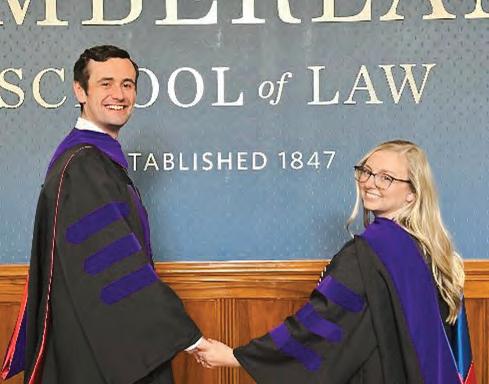
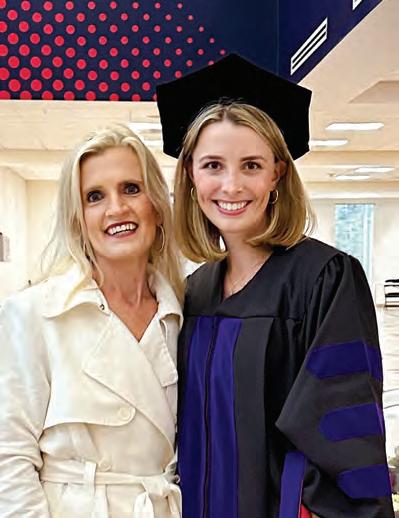
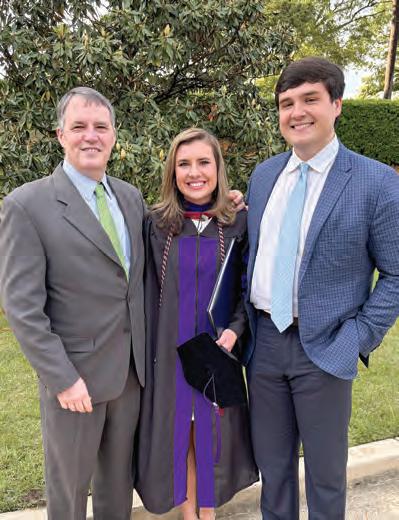
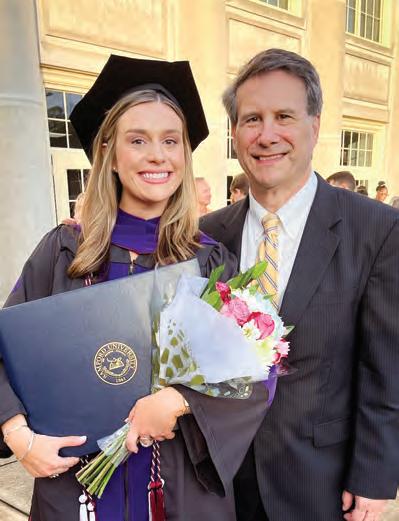
Morgan and Jordan Martin, JD ’25, were married while in law school and walked the commencement stage together.
Madison Clark with her uncle, John Kenneth Thompson Sr., JD ’94, and cousin, John Kenneth Thompson Jr., JD ’22
Harriet Shelly with her father, Mitchel Shelly, JD ’93
Rivers Dorey with her aunt, Jamie Johnston, JD ’98
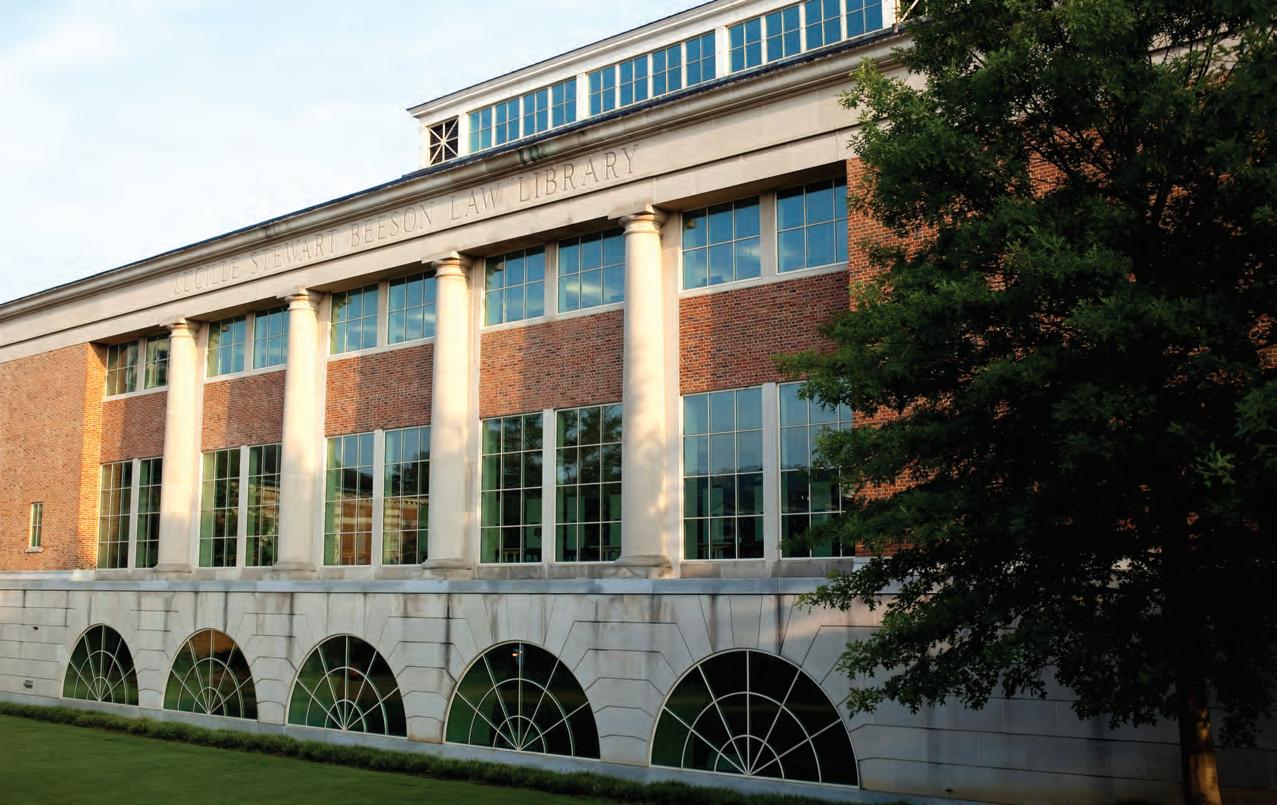
“Nice to Meet You”
For the past 10 years, I’ve had the privilege of working with an organization deeply committed to planned giving. Through that experience, I’ve seen how strategic planning and donor education can transform philanthropic impact. As the newest member of Samford University’s advancement team, I’m excited to bring that knowledge to a school like Cumberland School of Law—home to thousands of loyal legal professionals uniquely positioned to make a lasting difference through thoughtful estate planning.
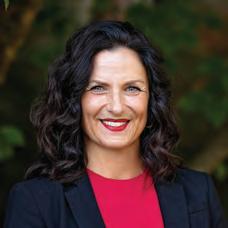
Planned gifts—also known as legacy gifts, estate gifts or deferred gifts—are contributions typically realized after a donor’s lifetime. These gifts often come to fruition long after the initial conversation and commitment, making them a powerful tool for long-term impact.
Advantages of Planned Gifts:
• They do not affect a donor’s day-to-day cash flow, making them accessible regardless of income level.
• Donors can designate their gift to a specific cause or school, such as Cumberland School of Law.
• The most common forms include simple bequests and retirement/investment beneficiary designations, with the national average bequest gift totaling around $30,000.
• Legacy giving is not reserved for the ultrawealthy—anyone can leave a meaningful impact without compromising financial stability.
If you’re interested in learning more about gift and estate planning, I encourage you to consult your estate advisers or reach out to me, Gene Howard, or the university advancement team. We’re here to help you explore how your legacy can shape the future of Samford University and Cumberland School of Law.
With Deepest Gratitude,

L indsey H. Tessin



